#saw this quote and immediately thought of them and the parallel world that could exist of them as teammates again
Explore tagged Tumblr posts
Text
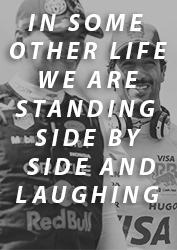
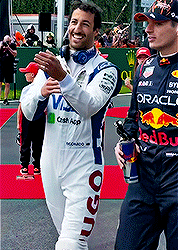




Love as the stars went out David Jones
#i need you all to unfocus your eyes when you look at these gifs/photos so you can ignore how pixelated they had to be in order to make this#daniel ricciardo#max verstappen#saw this quote and immediately thought of them and the parallel world that could exist of them as teammates again#but the reality that though they want to be together it just wasn't meant to be#the circumstances prevented that possibility but somewhere in another world they are#also just the juxtaposition of them in the summer attached at the hip and at spa thinking yeah this is going to happen and we're going#to be back together again only to lose that a handful of weeks later#and then for them to have this moment in that video message where daniel didn't have to do that#and honestly if you'd told me that was going to happen 3 weeks ago i'd have laughed in your face#but yeah in another life they were together for this
214 notes
·
View notes
Text
I haven’t been in the star trek fandom for very long (I’ve only just started binging the series in the last couple months), so it’s been pretty surprising to find out just how negative the perception of the reboot movies are.
this isn’t coming from the perspective of someone who grew up with the series, so it hit different for me than it might for people with a different relationship to TOS, but I thought it was genuinely clever and Respectful with how it was handled.
To quote leonard nimoy: “Well the alternative timeline gives them license to escape from canon concerns. I can’t see people saying ‘they shouldn’t do that because…’ or ‘that doesn’t tie in to such and such’ because it is a different time and place. Am I right about that?” [Link]
the entire Premise is that the original series happened as it was presented in TOS, but an event late in Spock’s life caused the creation of a parallel universe in which everyone’s lives were significantly altered through two key changes to the timeline. this gives them the freedom to Both revel in fanservice And explore different facets of the characters and their relationships.
the destruction of vulcan Vastly impacts the characters and the plot moving forward, and its a detail that a lot of people take issue with. but the emotional impact of sarek admitting Directly to spock that there is value in his humanity, that his feelings Aren’t wrong, that sarek married amanda because he Loved her cannot be understated. you can read all of these things into sarek as he was in the original series, but he Never had an open conversation about these things with spock. this creates a Believable and Rewarding change in their relationship, where we get to see a different facet of them Because of the changes made. and that’s exactly the appeal. showing us pieces of these characters that we never got in TOS that are nevertheless undeniably Them.
everyone is Different yes, but they’re also fundamentally the same people at their core and that matters.
kirk’s personality obviously takes the biggest change, with him experiencing trauma at a young age, losing his father, and having an implied abusive father figure after that point. he has a harsher personality in reaction to harsher conditions, he’s spikier and harder to love. but he’s also still fundamentally a Good person whose willing to risk everything to help people. he still has what made kirk prime a good captain and a good friend.
I’m not gonna say that it’s the most nuanced story in the world, but it explores a version of kirk that was born from even Less fortunate circumstances than kirk prime, exploring a kirk brimming with potential who learned to bite back after he was kicked down. exploring those themes of trauma and loss, of insecurity and growth, and coming to the conclusion that Fundamentally He Is Capable Of Good isn’t a Bad thing. you don’t have to like it, but his growth into a better person is The Point. they deepened his flaws (all of which were present in a less exaggerated form in TOS) To Show That Growth.
and then of course there’s his relationship with spock.
people are totally justified in not liking that they had a rough start to their relationship, I usually don’t like to see that kind of thing in reboots or hollywood adaptations either, but the way people talk about it is just unfair.
Yes kirk and spock and bones have a very strong relationship in TOS, they also already know each other by the time the show starts. to look at them having to learn to get to know and trust each other when they first meet and say that it’s Bad because they were already full on ride or die for each other in the og series is silly. TOS kirk and spock had to meet and fall in love with each other too, it didn’t just happen over night kings.
secondly, the entire point of the first movie is that Even With reality itself being altered to pull them apart they are fundamentally compatible people that are Bound to each other. they meet each other on bad terms because of circumstances outside of their control, and yet they’re still pulled into each other’s orbit and find the other slotting into place next to them as if they always belonged. one of the first things that spock prime says in the movie is “I am and always will be your friend,” spock and jim are Meant for each other and the movie goes out of its way to explain that. which is what makes it so Weird to see people complaining about how they don’t like each other.
it’s a Different relationship, but it’s absolutely no less steeped in yearning or queer subtext.
speaking of queer subtext ! some people are Very unhappy with spock’s relationship with uhura.
first thing I wanna say is that making the argument that they’re doing anything that the original series hasn’t done is just, completely untrue. kirk has fallen in love with more girls in the og series than he knew what to do with, leonard nimoy was a heartthrob in his time (and he deserves it, awooga) and spock reflects that ! Spock usually turns the women who come onto him down (or when he doesn’t it’s because a plant has literally altered his mind), but there are exceptions to even that. all of three of the main boys have plenty of romance subplots, it happens. if that takes the possibility of them being queer off the table for you (which it shouldn’t, m-spec people exist) then I’m sorry to say that TOS is not exempt.
now, I can understand why Specifically This Relationship could rub people the wrong way or being disappointed that they didn’t outright depict kirk and spock as having a relationship (if not in the first movie then in the following ones after they’ve gotten to know each other), but even in that context the way I’ve seen people talk about it comes off as insensitive.
no, the relationship did not come out of nowhere. they considered having spock and uhura date each other in the original show (and you can see signs of this in the earlier episodes, where uhura very obviously flirts with him and they spend time together in their down time) before they decided against it, and spock was originally going to kiss uhura until shatner insisted that he wanted to do it (because it was the first interracial kiss on tv). [Link 1, Link 2, Link 3]
nichelle nichols was asked about this exact thing (spock and uhura’s relationship in the movie), you can read the interview in full here [Link] but I’d like to highlight this paragraph in particular:
“Now, go back to my participation in Star Trek as Uhura and Leonard (Nimoy) as Spock. There was always a connection between Uhura and Spock. It was the early 60’s, so you couldn’t do what you can do now, but if you will remember, Uhura related to Spock. When she saw the captain lost in space out there in her mirror, it was Spock who consoled her when she went screaming out of her room. When Spock needed an expert to help save the ship, you remember that Uhura put something together and related back to him the famous words, “I don’t know if I can do this. I’m afraid.” And Uhura was the only one who could do a spoof on Spock. Remember the song (in “Charlie X”)? Those were the hints, as far as I’m concerned.”
the film makers looked at the fact there were Hints for uhura and spock, that they were Interested in exploring an interracial couple for the first time (both before and immediately after interracial couples won the right to legally get married) but Couldn’t because of the circumstances of the times and decided to Make that depiction. you don’t have to Like their relationship just because of that fact, but it’s Incredibly reductive to play down it’s significance as just a No Homo cop out. explicitly queer relationships are not the only progressive or culturally important relationships in fiction.
moreover, if you can’t imagine polyamory in the communist utopian future that’s on you.
moreover, this perception that this was a soulless cash grab is just, unfounded.
leonard nimoy returned to the role as spock for the first time in 16 years (since 1991) and this was Entirely because of the respect they had for nimoy, spock as a character, and the franchise as a whole.
Lets look at some quotes from nimoy in interviews regarding the film:
Leonard Nimoy: When I first read the script (...) I immediately contacted J.J. and said “I think it is terrific…I think you guys have done a wonderful job. There is still work to be done, but it is very clear that you and your writers know what you are doing and you know how to do this movie and know what it should be about….and I am very interested.” Then as time went by we worked things out with Paramount, but the most important things were J.J. and the script. (...) I am very pleased about that and I am very comfortable with where this is going. I think the writers have done a terrific job. They have a real sense of the characters and the heart of Star Trek and what it is really all about.
(...)
TrekMovie.com: Now in the case of the new movie you have been retired from acting for years. What was it about this one that made you want to act again and go through the make up again? What was it that made you say ‘I really want to do this?’
Leonard Nimoy: You are right, this is a special situation. First it is Star Trek and so I have to pay attention. I owe that to Star Trek. Second place is that it is J.J. Abrams who I think very highly of, he is a very talented guy. Then came the script and it was very clear that I could make a contribution here. The Spock character that I am playing, the original Spock character, is essential and important to the script. So on the basis of those three elements it was easy to make the decision. So those three things: Star Trek, J.J. Abrams, and an interesting Spock role.
[Link]
Praising the cast playing younger versions of characters from the original 1960s TV series, he [Leonard Nimoy] said: “Let me take the opportunity to say this. Everybody at this table [the cast] are very, very talented and intelligent people.”
“They found their own way to bring that talent and intelligence to this movie, and I think it shows. (...) When Karl Urban introduced himself as Leonard McCoy and shook hands with Chris Pine, I burst into tears. That performance of his is so moving, so touching and so powerful as Doctor McCoy, that I think D. Kelley would be smiling, and maybe in tears as well.”
“The makers of this film reawakened the passion in me that I had when we made the original film and series. I was put back in touch with what I cared about and liked about Star Trek, and why I enjoyed being involved with Star Trek. So, it was an easy way to come on home.”
“[In this Star Trek] they said things and showed me things, and demonstrated the sensibility that I felt very comfortable with, and I think that shows in the movie. I like it.”
[Link 1, Link 2]
again, you don’t have to like it just because leonard nimoy did, you don’t have to Agree. but the idea that nobody working on the film Cared is provably false. near everyone working on the project was already a fan of the series or were excited to be involved and did their homework. it’s genuinely a Miracle just how much of a labor of love this was, and in my opinion you can feel that through the movie itself. I’d highly recommend looking into interviews and behind the scenes details about the movies. they had a respect not just for the source material, but for leonard nimoy as a person.
there’s definitely more I Could say about this, but it’s 4 am now so I’m gonna shelve it jklfdsa
that said! it’s Fine to not like the movie, not everything is going to be suited to everyone’s taste, but the specific criticisms I’ve seen feel very off base
#star trek#kirk#spock#uhura#nichelle nichols#leonard nimoy#star trek aos#aos#star trek tos#tos#meta#long post#hello followers I write essays about star trek now
115 notes
·
View notes
Text
Part 37: Gertrude For The Win
The Magnus Archives was a horror podcast. It is now completed. Many of the show’s mysteries were never explained on the show. I intend to explain them. Spoilers for the show, but also spoilers if you wanna solve these mysteries yourself.
This is the last post in the series. It’s not gonna make sense unless you’ve read Part 11, Part 20, Part 21 and Part 33.
Cracked Foundation is apparently about Anya Vilette, a cleaning woman from a parallel universe. She goes to clean the house on Hill Top road in her universe, but ends up getting transported to the universe of the Magnus Archives.
Anya Vilette sounds a lot like Anne Willet. I believe they are the same woman. And no, I don’t mean Anya is Anne from another universe. Anya is from the Magnus universe. Her memories of another universe are false.
Who gave her the false memories? Agnes. Agnes is connected with Hill Top Road and an avatar of the spiral, and the spiral often makes false memories. When Annie traveled back in time, it resulted in there being two Annie’s. Agnes messed with the mind of one of them, making her forget who she was. Anya’s memories contain bits of truth, like the name being similar. I guess there are limits to how much Agnes can twist someone’s memories.
Anya says she had a sort of vision of the tree on Hill Top Road grabbing her. The tree is made by Agnes, and Agnes is the one messing with her mind. So sort of true, but not quite.
Anya says the tree has eight arms. And later says eight spindly arms come up from the crack and grab her. Eight arms like a spider. So it seems the tree is of the Web. But the tree is not of the Web, it was made to trap something of the Web. Again sort of true, but not quite.
In The New Door, Helen says that the door handle to Michael’s door was warm. Quote from Anya from Cracked Foundation about the door handle on the basement door: “I remember the little handle was warm. I don’t know if that’s just my memory playing tricks on me, but I do remember that.”
So the warm door handle is a clue that this is some Spiral shit. And in the very next sentence there is another clue when Anya talks about her memories playing tricks on her.
Anya claims she’s traveled back in time a couple of weeks. Anne was a time traveler, so again a bit of truth to her memories.
Anya says she can’t find her favorite coffee shop. Agnes did have a favorite coffee shop she visited for years. That inspired her when she made up fake memories for Anya.
Anya says “They said I should come and talk to you. A few people did. People I thought I knew, but they were different.” And “I’ve tried to talk to my friends about it. Those of my friends I can find, but they seem distant, like they don’t really know me.” Who are these friends?
I think the friends are some combination of Agnes, Gertrude and Gantulga. Or maybe Gantulga disguised as various people. They were never Anya’s friends, she just has fake memories of them being her friends. And why are they telling her to go to the Magnus Institute and make a statement? To trick Annabelle and the Web. Annabelle listens in on John, so she would have heard this statement.
Gertrude and Agnes want the Web to think the reality rift can be used to travel to other dimensions. But it can’t. When the Web went into the crack in reality, it thought it would spread to many other universes. But instead it got nowhere. The Web was destroyed along with the other fears.
Why did Agnes choose Annie as her victim? First because Annie is evil and Agnes would prefer to not harm an innocent. Second, because there already is another Annie. If Agnes had chosen another victim, people might have figured out that victim was the same as a missing person.
In Vampire Killer Trevor says “...I’ve always had a kind of uncanny knack for guessing people’s ages. People will come up to me on the street and ask me to guess their age, and I’ll tell them and most of the time they’ll be shocked when I get it right."
There are two ways of interpreting this. First that most of the time he gets it right. Or second, he is always right, and most of the time people are shocked. I believe the second interpretation is right. I think he has a power to help him with Hunting. If he sees someone that looks like a normal man but is only a couple of years old, it's a monster. Same if it's hundreds of years old.
The only time we hear Trevor estimate someone's age is in Children of the Night. He says the homeless woman filled with spiders was about 40. Given Trevor’s age guessing power I think this is a clue that the woman’s age is important. I think the woman is Annie.
In 2006 Ivo talks with Annie and estimates she is in her fifties. (It is pretty rare we get the age of characters in the show. We get Annie’s age because it’s important.)
In January 2009 Trevor meets the homeless woman and says she is in her forties.
22 April 2009 Anya makes her statement.
So the Annie Ivo talks with is the older version from the future. And given that she is around a decade older than the other version she probably time traveled quite a lot. Not just the three years when she took Father Burroughs back in time. She probably traveled back and forth several times to get things just right and get Burroughs and Ivo at Hill Top Road at the same time.
Agnes attacks the younger version of Annie and messes with her mind. Makes her forget who she is. Annie ends up a homeless person. That’s why the homeless woman is full of spiders, Annie is a Web avatar. And that’s why a Web avatar is so pathetic, just using her powers to get a place to sleep in homeless shelters. Later Agnes gives Annie fake memories and sends her to the Magnus institute.
In This Old House Annabelle’s statement is about Eowa, a Saxon from long ago. He built a house where Hill Top Road would later be. He was tormented by one of the fears. Annabelle says Eowa’s name, face and taste of fear lingers after centuries. But she’s not sure which of the fears tormented him. Then Eowa finds himself somewhere else, where the Mercian’s had pushed further. Annabelle thinks he was transported to an alternate universe. She’s wrong.
The fear that was tormenting Eowa was the Spiral. The Spiral was messing with Eowa’s memories, making him remember that the world was different. But he was always in the same world. The Web misunderstood and thought there existed a crack to other worlds. There never was.
All the weird effects of the crack described This Old House fits with the Spiral. Air slightly thinner, lights slightly dimmer, slight chill in summer, unsettling warmth in winter, vibrant fungus, dull flowers. All could be the Spiral suggesting something is wrong.
The grain of the wood of Eowa’s house gets warped. Trees are a symbol of the Spiral, so warped wood fits.
The Spiral influence gets more obvious with Geoffrey Neckham. Strange draughts shifted his candle flame. Gentle murmurs that almost sound like voices. Thinking you maybe are hearing voices makes you question your sanity. Geoffrey even finds a new room in his house. Weird architecture is a Spiral specialty.
So the Web enacted a ritual to widen the crack in reality, manipulating avatars to fight at Hill Top Road. The ritual sorts of work. A crack appears, but one that can only be used for time travel. Traveling to other worlds was never possible.
In Doomed Voyage who ordered Gantulga to find the camera? The explosions that killed the captain and supposedly killed Salesa is a clue. Who likes to fix problems with explosions? Gertrude. Via time travel she knew Gantulga would replace Salesa. She hired Gantulga and arranged the explosion to fake the death of Salesa/Gantulga.
Maybe she brought a camera lens with her to repair the camera to test it. Maybe when the camera started working, the captain saw that Salesa was Gantulga. Maybe that was what he was trying to explain when he talked about betrayal. But due to the shrapnel in his head he didn’t make much sense.
Gertrude wants Annabelle to have the camera. The camera allows Annabelle to kidnap Martin without John immediately knowing where Annabelle is. I think there was a timeline (or several) where Annabelle didn’t have the camera. Where she came for Martin and John just smote her. So Gertrude or Agnes had to go back in time and fix things.
In Ignorance Gantulga said he hopes that if Annabelle ever wrecks his oasis, that she has the courtesy of killing him first. And Annabelle obeys his wishes and kills him when she takes the camera. Why does Gantulga say that, if he’s in on Gertrude’s plan to destroy the powers? Seems like he would only suffer torture for a few days until the plan succeeded.
In Parting John realizes Annabelle has the camera. He checks to see if Salesa is dead, which he is. Quote from John: “Yes. I checked. I guess she liked him enough to do that for him before she stole [the camera].” Note the phrasing. John guesses Annabelle killed Salesa. John didn’t check how Salesa died, only if he’s dead. John doesn't realize Salesa died years ago from drowning.
I think there was a timeline where Annabelle didn't kill Gantulga. John checks to see if Salesa is dead, confirming he is. Then later he talks with Martin and Martin says Salesa is alive. John realizes something is fishy, Gertrude’s plan is ruined somehow. So Gertrude or Agnes goes back in time and fixes things. Gantulga sacrifices his life to defeat the powers.
In I Guess You Had To Be There Lynne gives a statement about a burning ghost. Later Lynne shows up as one of the people rescued by Georgie and Melanie, though she has forgotten her name and calls herself Celia. From a storytelling point of view, what’s the point of having Lynne show up again? It doesn’t add anything obvious to the plot.
Helen tries to eat Lynne. Why do Helen care about Lynne?
I think the burning ghost Lynne saw was not a ghost, but rather Agnes. In Lynne’s statement she didn’t interact with the burning woman much, just went back to sleep. I think she did interact with Agnes, maybe talked to her. This choice gave Agnes power over Lynne. Agnes makes Lynne forget that she talked to Agnes or whatever. But Agnes now has the power to influence Lynne when she’s in the tunnels.
Helen must have realized Lynne was influenced by Agnes and tried to sabotage Agnes’ plan.
Lynne in the one that tells John that Annabelle took Martin. Since Annabelle has the camera John couldn’t use his powers to know that. I think there was a timeline when John didn’t know Annabelle had Martin and things went differently. Maye John went back and killed Elias without finding Martin and talking with Annabelle? Whatever happened Gertrude or Agnes went back in time and fixed things. Agnes influenced Lynne to warn John.
In the Librarian when John leaves Leitner to smoke a cigarette, Leitner talks, apparently to no one: “I’m not sure you would have liked him, you know. He’s paranoid enough. But I don’t think he’s got the stomach for it.”
I think Leitner was talking to Gertrude. He knew she was alive. Maybe he thought Gertrude would listen to the tape one day. Or maybe Gertrude was in a nearby room, listening in on the conversation.
Why did Leitner need Gertrude’s files on the Unknowing if Gertrude was there? Maybe there was something in the files Gertrude couldn’t remember. Or maybe Gertrude tricked Leitner. Maybe she told Leitner to rescue John from not-Sasha and then talk to John. Maybe she knew Elias was going to kill Leitner, and she needed that to happen, so John could get the Hunt scar from Daisy. Gertrude wanted Elias' ritual to succeed, it was needed to trick the Web.
During the apocalypse Gertrude and Agnes probably hid in the tunnels under the Archives.
So in conclusion: Gertrude destroyed the fears. The end.
13 notes
·
View notes
Note
Doesn’t the Phoebe storyline sound a little reminiscent of the Noah storyline?
Hmmmm, I mean. Yeah? Kind of? In the sense that it’s an FBI agent infiltrating the inner circle of the girls by way of personal relationships, but at the same time, I think Phoebe brings a really interesting, and fresh dynamic to the show and will allow it to explore territory it actually hasn’t really dived into yet.
The show’s always been very, very insular about the girls’ friendship, and it’s something that has only ever once been both successfully infiltrated and weaponised, which was when Turner created the rift between Ruby and Beth in s2.
Turner saw the closeness between the two of them and knew there was something there he could use, but he didn’t respect that closeness and that relationship, so failed to plan for the wider ramifications. In other words, he didn’t think there was a scenario where Ruby would pick Beth, because he doesn’t take women and relationships between women seriously.
He viewed it as something frivolous, and thought it would be easy to disrupt, because of course Ruby would choose her husband, her family. Even when he asked Ruby how long she and Beth had been friends, it was with an air of patronisation (that man, James Lesure could always deliver so well. I miss his line delivery so much!)
The thing is, it’s not just Turner. All the men on this show either exist completely outside of that friendship – like Dean, Greg, Dr Josh; struggle with feelings of jealousy and conflict over that friendship – Stan; or view it as a means of controlling somebody in that relationship – Rio with Beth, Noah with Annie, and Turner with Ruby.
It’s different with Phoebe.
The show’s already demonstrated that Phoebe not only understands that bond, but wants it. The show’s been careful about paralleling her with Beth – the I Feel Pretty montage springs to mind immediately, but it’s also drawn out the fact that Phoebe is an oddball in her workspace, lacks relationships and community, and gosh, it was even said explicitly in the finale – Phoebe’s never had friends, but she knows about female friendships:
Phoebe: Here’s what I know about girls who are this tight. Henry: Literally nothing Phoebe: But they know everything about each other. She’s not in this alone.
Phoebe has the dual motivations of respecting that relationship, wanting to use it against the girls, while also yearning for it herself.
An area this show has only ever touched on so far is that in feminine spaces and with feminine clusters of people, Beth is entirely alpha. It’s easy to forget, because she’s so prone to rolling over with Dean and being pushed over by Rio, but outside of (and with! Actually!) Mary Pat, Beth is in every way top dog with other women.
She’s at her most successful, her most charismatic, her most bossed up – for better and for worse (and it really is both) – when she’s using her power as a woman (her ‘can I speak to the manager’ strongarming of Gil immediately springs to mind) or operating with other women (the secret shoppers, Lucy, etc), and from the sounds of it, that social power with other women is exactly what this arc with Phoebe is set to explore.
The quote from Jenna and Bill in the EW interview discusses it:
BANS: Yeah, you even see in episode 11 where she's fascinated by these women on Ruby's phone and fascinated by their friendship. I think there's part of her that wants a piece of that, that never had that when she was growing up and wants to be like them. Her relationship with Beth, in particular, gets very, very complicated. Bill and I keep calling them frenemies. They become friends in a way that Beth and Agent Turner never really did, and I think that makes it all the more complicated.
KREBS: Phoebe always knew girls like Beth in high school, and she always wanted to be with girls like her and was never really fully accepted, and I think she's still trying to figure all that out through Beth as an adult.
BANS: We're almost less excited about the case and more excited about the personal dynamic between them, and how that sort of catapults the entire show into a new world we haven't been in yet. It definitely goes unexpected places. I think you'll see in the start of season 4, that friendship between her and Beth really launches us into a different sphere than the women have ever been in before.
It’s actually really new territory for the show, and if they do this storyline right, it honestly might just be my favourite one they’ve ever done. I’m really, really excited for it.
#beth boland#gg 3.11#gg season 4#phoebe donnegan#ruby hill#annie marks#femininity#welcome to my ama#Anonymous
26 notes
·
View notes
Text
Dark Road and the Book of Prophecies and its Final Passage
Ever since the very first story content from Dark Road, I can’t stop thinking about this.

The fact that the Book of Prophecies is common knowledge, or at least, something that keyblade wielders get taught about, is really something that took me out.
In Dark Road we encounter Emblem Heartless, even though they technically wouldn’t exist for at least about 65 years in the future, making us believe that the Book of Prophecies projects them into these not-yet-recompleted worlds until they are recompleted. (The worlds in Birth by Sleep are recompleted. They inhabit no Heartless anymore, somewhere between Dark Road and Birth by Sleep the projection ended and all worlds were recompleted. Pureblood Heartless only appear in the Realm of Darkness / Dark Corridors.)
That means the Book is still around in Dark Road, yes? Where is it and what actually got passed down from it? And where is it now? What does that Final Passage even mean? First things first. (Read More! it’s going to be long.)
I shouldn’t have been that surprised that the Book of Prophecies is apparently something Eraqus and Xehanort know about. Xehanort directly quotes it in KH3.

Which is actually more phrasing than anything else, because if Xehanort means the Final Passage from it, then it would be:

That it is not a direct quote from it might actually be important.
Emblem Heartless, as we know from KH2′s Secret Ansem Report 5, were made by Xehanort. Now we don’t know how much in detail the Book of Prophecies mentions events, because we ... really don’t get to know any quotes from it except the Final Passage. But if we assume the Book mentions at least the broader details of things, it makes me wonder if the Book namedrops Xehanort in combination with the Emblem Heartless?
Where am I going with this?
The Book of Prophecies was only for the eyes of the person who got it. Foretellers and Brain. The Foretellers are long gone and so are their Books, the only remaining Book would be Brain’s. We know Brain immediately took the Book and never let anyone else on it, keeping it to himself only. (Heck, in the scene where Brain reveals that Ventus isn’t on the Union Leader list, Skuld is astonished that Brain even has the Book, after all these years they were together.) Brain was secretive about his Book. Well, Ava told him he should keep it to himself (even though she could have only meant the List, but here it reads to me she means the Book and the List.), which makes sense if she wants to push Brain into the direction of changing fate.
So, if Brain ended up in Scala after Daybreak Town fell and took his Book with him, then he may have continued to be so secretive about it, never telling anyone about its contents. However, what he does mention is its abilities. He didn’t shy away from that.

But.
The Keyblade War was supposed to be “forgotten”, the Dandelions weren’t supposed to remember that, yet somehow that knowledge about it got passed down. Vague, and some details aren’t quite correct if we compare it to what we’ve seen in KHUx. Which, I guess, makes sense that parts of it get lost through history.
(Either Brain ended up talking about the keyblade war to others just to meddle with stuff, because he wasn’t supposed to and was set on the path to change fate, or someone did get a hold of the Book and passed that knowledge down, (Or Luxu did, who knows, he must be around somewhere in Scala) as well as mentioned what the No Name keyblade does. But that’s another story there.)
What I’m saying is that the actual contents of the Book never really surfaced and only its abilities were truly important knowledge worthy of teaching.
Just like the keyblade wielders in Scala got taught apparently. They know about the Book, what it can do. However, no one else has read it, no one else knows the future except for the last sentences.
So, where is it now? Scala fell, worlds got recompleted and thus the projection of the Book ended. Is it gone, lost forever?
It can’t really be. We know Maleficent is searching for it as she mentions it in the Re:Coded movie (as well as the Box, but that’s beside the point here.) I don’t think they will drop this plot point just like that, especially now that the whole Black Box - Foretellers - Luxu - Return of the Master of Masters plot point will be relevant in the future soon.
The Book can still be around. As of right now, the only “survivors” of Scala we know are Eraqus and Xehanort. If someone took it, then it could be them.
We know Xehanort gets No Name eventually and gets it somewhere after his time travel shenanigans (because he mentions in the Re:Coded movie secret ending how it has yet to become a reality for him), and those time travel shenanigans happen some time after he met the Master of Masters. In the Re:Coded Secret Ending, Xehanort quite obviously states he follows his destined path accurately. He does not want to meddle outside of it. He does what he feels like he is supposed to do. Would be benefit from the Book of Prophecies here? No, not really. He follows it and there is that. Besides, if he had the Book of Prophecies, wouldn’t he know what “happens beyond the keyblade war”? He would get all the answers he wanted. But he didn’t had these answers and thus did his thing.
The person who doesn’t want to follow “destiny” is Eraqus. And he even mentions that in KH3.

We know that Eraqus eventually becomes quite light obsessed. And if we look at Dark Road, we slowly might see why.
The whole plot point of the missing upperclassmen, how they (probably) vanished because of some darkness force - (probably) his classmates dying also because of some darkness. Eraqus becomes wary about the outside worlds, tries to hinder Xehanort from leaving for another journey

We know from Dark Road that it was a common practise that keyblade wielders who were about to take their Mark of Mastery soon, to leave for the outside worlds to broaden their horizon etc. (1, 2) and while Eraqus says their Mark of Mastery isn’t so soonish, Xehanort leaves anyways. And we also know that Eraqus asks to leave as well eventually (according to the KH3 Secret Report from Xehanort in his Mark of Mastery Journal), but that happens after Xehanort did his world tour.
However, I do believe something must have happened that Eraqus becomes so ... against visiting the outside worlds.
I do believe it has something to do with the darkness in Xehanort, or that Eraqus also saw the darkness which Xehanort saw as well. Except Eraqus’s response was to close himself off and never interact with it again, while Xehanort got interested in the darkness.
Eraqus, as we know him from Birth by Sleep, does not follow these customs from Scala anymore. He does not let Aqua and Terra to the outside worlds in preparation for their Mark of Mastery (and let’s not even mention Ventus here). Seeing the darkness in the outside worlds, losing his friends and upperclassmen made him fully invest in the light instead - while he always preached about balance, his only focus was light. The same as Xehanort, except he as well didn’t find the balance and ended up using darkness instead.
So, what does this have to do with the Book of Prophecies?
Eraqus knows of the Final Passage. He is scared of the darkness, what it can do. His teachings of light express that very well. Darkness cannot prevail if there isn’t any, so he only focused on the light, trying to block out that darkness can and is a natural occurence. After all, running away from his problems is what he does best ...
While Xehanort followed his destiny, Eraqus tried to do the opposite. Again: “Who is to say I can’t change it? And maybe light will prevail.”
... Which really is some neat parallel to Brain here.
So I believe Eraqus ended up with the Book of Prophecies, took it with him to the Land of Departure and hid it there in hopes to change what was written on that Final Passage.
If he used it, or read it, is something I question. If he did read it, then he had too much fear to talk about it, because I don’t think he mentioned anything to the Wayfinder trio at all.
However, just for the train of thought: What if Xehanort ended up with the Book of Prophecies anyways?
Xehanort could potentially have profited from it as well, even if he didn’t end up reading it at all. As mentioned earlier, the abilities of the Book were known, were taught. It can project things from the future, be it enemies or worlds.
Interestingly enough, we know in KH3, Young Xehanort was able to create a copy of the Toy Box world.

... Which, I guess, could be possible with the Book of Prophecies? For that he didn’t even have to read it, but to use its abilities.
Another instance where this happened was DDD and Traverse Town. There are two copies of it as well. If there is a connection between that and Toy Box, I don’t know.
But maybe that is something to think about as well.
--------------------------
One Final Thing: What does the Final Passage even mean? Why does the Book end there?
“On that fated land, a great war shall transpire. Darkness will prevail and the light expire.”
A keyblade war, obviously. The ongoing battle between light and dark finds its conclusion. There is a winner this time, one side - darkness - won, and light lost.
You know, just like in the first round of KH3. It even gets directly mentioned.

And just like that, it ends.
We know it didn’t, Eraqus pulled the chess piece back, Sora went through the tear in the fabric and activly changed destiny, and called upon the Light of the Past.
... So, what about the Book of Prophecies?
Did it change its text? Does it continue further from here on now?
We know changing destiny is a thing, even back in Union Cross, as Ava decided to give Brain the Book and not the one the Master of Masters circled in red. Ava and Brain question even back then what happens to the Book if a person does not follow their destiny. (1 , 2 , 3 , 4)
... We just don’t know, yet, what happens to the Book, the most sense would be that it does indeed change its text the second something gets altered. Though, wouldn’t that mean that the Master of Masters would know this beforehand, if ... he can see the future?
It’s a paradox I can’t explain in Kingdom Hearts terms. At this point I would say ... altering futures are a big thing coming to KH in future games, but who knows, really.
--------------------------------------
Regardless what is true what I mentioned in this post, I am very excited to see what future KH plot will bring. There is so much on it, so much to think about ...
There are a few more things in my head that don’t really have something to do with all that, but I think that’s enough for now, thank you for reading :D
#kingdom hearts#kh theory#KHDR#Dark Road#Union Cross#oh my god im so sorry this got so long#anyways my train of thought is terrible confusing ................... but this is all i think about rn#mild Ancestor Theory as well lol#shakes Dark Road up and down#tell me your secrets#I would like to Know Them
9 notes
·
View notes
Text
Crossing Parallel Lines- Sam Winchester x Reader: Chapter 8
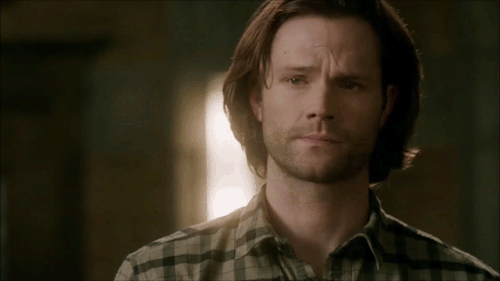
Warnings: Angst, sadness, cute boyfriend! Sam (again. I mean he’s just a big teddy bear) tooth-rotting fluff, mention of Jensen Ackles (cause ya know, he’s a “different person”)
A/N: I do not own any rights to Tangled but I thought this quote was perfect for this chapter. Sam and the Reader are just adorable and that I love you quote always stood out to me.
Word Count: 1569
Author’s POV
After the long drawn out conversation with Sam about whether or not to stay, and some research into the matter, you made your decision. Was it perfect? No, but it could fulfill the desires of both you and Sam.
“Hey, can I talk to you?” You text Sam and the same to Dean, asking if they would meet with you. They both had been away for the first half of the day so you wanted them home for this.
“Of course, baby. Where do you wanna meet?” Sam texted back.
“Come home?” The fact that you call the Bunker your home, made Sam smile and feel all warm inside. Dean would joke saying that you two are practically living out a chick flick but he didn’t care; he was in love.
“We’ll be there as soon as possible. I love you.”
“I love you, more.”
“I love you most.”
“Isn’t that some quote from a Disney movie or something?” Dean asked from the driver’s seat as he snuck a glance at his brother’s phone.
“Oh, and you know that how?” Sam questioned.
“Just a guess. It sure sounds all cheesy and overly chick-flick-like so.” He answered with a shrug.
“Well if you must know, it’s from Tangled, one of y/n’s favorite movies.” Sam defended himself and his girlfriend. Not that they owed Dean any kind of explanation to their relationship, but any way to end the uncomfortable conversation.
“So, what do you think she wants to talk about?” Dean asked, changing the subject.
“I’m not sure but I think it’s serious. I mean, she hardly ever texts when we’re on hunts unless it’s urgent.”
“Trouble in paradise?” Dean quirks an eyebrow with this question.
“Not at all. I just hope she’s okay. I don’t know what I’d do if something happened to her.”
“You’re really crazy about this girl, aren’t you?”
“I love her man. I never thought I would in the lifetime, you know with the hunting and what not but she gets it, man. She sees it and offers good ideas. She knows I guess mostly from that TV show in her world but, it works most of the time.”
“I know. I see the way you are with her and how you look at her; it’s gross.” Dean teases.
“Shut up,” Sam says, pink dusting his cheeks.
“Nah man, I’m happy for you. I really like y/n. I think her and I could be good friends. But if you hurt her, I’ll take her side and be sure to kick your ass.”
“Really? You’d take her side over mine?”
“Yes. Do you see that girl? She wouldn’t hurt a fly.”
“No, she could but she’d feel bad about it later.” Both brothers laughed at how differently you saw the world than they did. They usually had to deal with the dark and grim and the sadness; the evil of the world. But you always saw the positive side of every situation. Making jokes with the boys, always wearing bright clothes to lighten up their days. You’d be sure to add sweet smells around the Bunker, whether with baking or wax melts and even yourself and the variety of perfumes you’d wear. You brought a different essence to their lives and they loved you for it.
About thirty minutes had passed and you heard the sound of the doors shutting to the Impala. Not being able to control your excitement anymore, you bound up the stairs and out the front door, quickly rushing over to the parked car, jumping on Sam as soon as you were close enough to him.
“Oof.” He said as the breath in his body was knocked out of him just slightly.
“I missed you!” You say, nuzzling your nose in his neck, inhaling the scent you missed the most.
“I missed you too, baby girl.” He whispered back, still holding you close. “You know I can get used to these homecomings, as long as you’re here to greet me.”
You frowned just the slightest bit but Sam took notice.
“What’s the matter?” He says, putting you down.
You shake your head and take his hand. “Let’s go talk about that.” You kiss his lips quickly and help him and Dean with their bags. Heading inside and down to the main living area, Sam and Dean both sitting across the map table from you so you could look at them both.
“So, I asked you guys here because I’ve made my decision.” You could see it on his face almost immediately; Sam was nervous.
“I decided that I will go back home. There is a lot that I need to do back in my world and I’ve already overstayed my welcome. I can’t just spontaneously leave everything behind; I’m more sensible than that.” Frowns covered the faces of both brothers and the guilt you felt for this decision, almost became unbearable.
“But there is something else. When I came over here, I did not expect to gain a best friend and even more importantly, a boyfriend. I didn’t know where I was going to go when I said that spell but I wanted to take that chance. And yeah, it is a bit crazy, you guys are fictional characters in my world. That doesn’t matter though because you’re real here. Sam and Dean, Dean and Sam, the brothers who save people and hunt things; the family business! Which is just a catchphrase and the business of one of the guys who plays you on TV, in my world. You two took my heart and I don’t think I’ll be getting it back anytime soon, right?” You smile at the still-sullen boys before you.
“With all this being said, and we can verify it with Rowena, I’d like to come back here, as much as possible. I crossed through parallel lines to get here the first time and I’ll have to go back but why not do it more often? I mean, there’s nothing that says it had to be just a one-time thing, right? I’m sure I can come back and forth as many times as I want to. And that way, Sam and I can still be together and Dean, we’ll still be best friends. What do you guys say?”
Sam pushed his chair back from the table and walked around it to join you. He looked down at you with a sad look that never left his face, fingers gliding under your chin to pull your face up to look at him.
“Sweetheart, that usually doesn’t happen with spells. Once you do it, you can’t do it again. That’s always how it’s been and I’m afraid that’s what’s going to happen here. Rowena will tell you she can’t do anything to bend the rules of lore that has been around for centuries.” Sam says and as his words sink in, you don’t believe them.
“No! No, Sam, I won’t accept that! There has to be something we can do where I can live in my world and live in this one and come and go as much as I want. I can’t just give everything up but I can’t leave you either. I can’t; I won’t. Sam, please, you, what are you saying? Are you just giving up on us that quickly? Not even trying to see if Rowena could do something different? She’s one of the most powerful witches ever to exist; she’s gotta know something!
“Sam’s right kid, it’s almost always a one-and-done situation. I don’t think there’s any way around it.” Dean chimed in.
“You’re giving up on this too?” You spin around to look at Dean with the same disbelief you were looking at Sam with.
“We’re not giving up on you, sweetheart.” Dean defends.
“It sure sounds like you are, both of you! I knew I shouldn’t have come here; I hate you guys!” You yell, rushing out to your room.
“Y/N!” Sam calls after you but Dean stops him.
“Give her some space, man. She’s really upset and I don’t think either one of us could comfort her right now. She said she hates us.”
“She doesn’t really hate us, Dean. But you’re right; now’s not a good time. I just had to tell her the truth. I can’t let her go off and believing something that isn’t true.”
“I know but maybe…What if Rowena could do something?” Dean suggested.
“What? Dean we both know spells aren’t repeatable; never have been.”
“But this is one we’ve never seen or even heard of before. Until she came, we didn’t know there was another world out there besides this one. And then she came and took over our lives in the best possible way and you fell madly in love with an amazing girl. You can’t just give up on her!” Dean spoke, raising his voice at the end.
“Believe me, Dean, that is the LAST thing I will ever do. I won’t ever give up on her nor will I ever love someone as I love her. I will do everything in my power to stay with her, no matter the cost to me. If I have to make a deal, fine. If I have only a short time left, I want to spend that with her. And I won’t stop until she is in my arms again. Get Rowena on the phone; now.”
Tags: @simpleb00x @fandom-princess-forevermore @lilulo-12 @juju-la-tortue @marvelfansworld @grace15ella @hunting-the-grievers
21 notes
·
View notes
Note
Hello! What makes you ship Levi and Eren? (always curious about how people get into ereri)
Hi there, anon! I wish I could’ve answered this briefly but you’ve asked me something that I could honestly ramble on about forever. I’d try to be precise but I’m afraid it’d still be quite long because I don’t have the time to summarise, so bear withe me please >.<
Okay so first of all, I used to be more into Eremika than Ereri in the beginning and the precious Eremika moment from Chapter 50 owned my heart. Back then the 13 y/o me didn’t get shit about Levi and Eren’s platonic canon relationship. But the popularity of Ereri was overwhelming and even though they were far from being my OTP I still shipped them in AU settings mainly because the fanfics were excellent. Also, at that point of time, I was more invested in the Naruto fandom and SS was my only OTP. In fact, I didn’t even know about the Visual Novel until late 2015 or early 2016 (I don’t remember exactly) which made me really get into Ereri. Reading the VN actually changed my whole perspective on Ereri and made me realise the depth of their canon relationship. When I re-read the manga again after that none of their subtle moments were lost on me and that’s how the ship started growing on me. Since then I even began picking up on a lot of parallels, symbolisms, etc. associated with them and all of that collectively went into becoming the reason why Ereri is my OTP.
I probably cannot think up of everything that makes me ship them at one go. Also I have my internals next week and Im losing my mind. Anyway here are some of the reasons that immediately came to mind when I saw your ask:
• Levi equating Eren to “The Tyger” : The VN concluded with the first two stanzas of Blake’s poem “The Tyger”. The poem is taken from The Songs of Innocence and Experience and the entire volume focuses on two things : the transition from childhood into adulthood and the existence of both beneficial and malevolent forces in human beings. So in the novel, Levi’s understanding, acceptance and even admiration of both the humane and the monstrous potential in Eren is commendable : “A monster with perfect, fearsome beauty; that inspires awe” Also, Levi acknowledges Eren’s will that “cannot be made to surrender” and his drive for freedom that “people living like birds in cages won’t get”. This shows us how Levi realizes that Eren’s mental maturity is not that of a normal 15 yo; that his “experiences” have made him into someone much more gritty, resilient and strong-willed for his age. “The Tyger” here is the agent of free-will and the poem further emphasises on free spirit by incorporating references to mythological figures who’re deemed as humanity’s heroes, for instance, “seize the fire” refers to Prometheus who is mankind’s hero because he stole fire from Zeus. It is said that because of him mankind could gain knowledge ; that mankind could step out of the bounds of ignorance ( See the parallel with Eren who said how ignorance is the biggest obstacle to freedom in Chapter 112 ). Another hero alluded to in the poem is Icarus who grew his wings of freedom and attempted to reach the farthest point (dangerously close to the sun) even though he was burned in the attempt (parallels with Eren’s whole attitude of ‘no matter what kind of hell awaits me I’ll keep moving forward’ ). Yeah so, that’s how deep Levi’s understanding of Eren runs.( Can you imagine the entire arc of Eren’s character was foreshadowed in Levi’s thoughts about him?) To me understanding is the most important factor when it comes to a ship so, I think Levi’s pov in the VN is the biggest contributor to their development.
• The way Eren looks at Levi : Idk how cliched this sounds but yes, the way he looks at Levi honestly gives me life. Be it in the Forest of the Giant Trees, or in the Reiss Chapel or in the Marley Arc, his eyes say it all. Add to this his signature shaky way of saing “Captain?”, idk if it’s only me but that just carries so much feeling, so much angst, so many unspoken emotions right there. If Levi’s thoughts on Eren made me fall in love with Ereri in the first place then Eren’s body language when it comes to Levi made me fuckin smitten over them (i kid u not honestly this ship is one of the very few things that actually give me the will to live)
• Hope and Strength : Honestly, I love Levi and Eren’s roles as humanity’s strength and humanity’s hope because this actually speaks volumes about their relationship. If Erwin gave Levi’s strength a dimension then Eren gave his strength meaning. Their roles in canon show their inter-dependence. After all, what is strength without hope? I don’t remember who first pointed this out, but someone said that this is the very concept the Survey Corps logo alludes to. The Wings of Freedom are shown as blue and white because royal blue represents strength and white represents hope. So the Wings are symbolical of what Levi and Eren individually stand for as well as signifies their dependence on each other.
• Levi’s role as Eren’s guardian : I love him both as Eren’s protector and his mentor. (oh also let’s not forget Eren had a little crush on him,,how adorable 🥺)
We’ve seen Levi giving it his all to protect Eren multiple times. And when he couldn’t protect him during the Battle of Trost because of his injury we see him clenching his fists in frustration. Again, in RTS we see Levi quite baffled when Erwin orders him to protect the horses and not protect Eren. Also in the RTS when Eren got flung on top of the wall, Levi was visibly concerned and then when Erwin couldnt come up with a plan that’d guarantee their survival, he quickly suggested that BOTH Erwin and Eren flit from there. This goes on to show how Levi thinks Erwin and Eren are EQUALLY important for ensuring humanity’s survival. It is evident from here that his liege and his mentee both belong on the same pedestal and he’d do anything to save them. Levi similarly comes up with an abrupt suggestion again in Ch 112 to save Eren when the Soldiers informed him that the higher authorities plan on having Eren eaten. Even though he clearly disapproved of Eren’s actions in Liberio, even though Levi himself always adhered to rules and discipline, he still had faith in Eren and he’d never accept such a ridiculous order, even if it came from Pixis. (plus he remembers the first time he met Eren which sort of makes us realize that Levi still sees himself as Eren’s protector🥺)
Next comes Levi’s role as a mentor in Eren’s life. I think his words of advice to Eren is an important factor that made him the man he is today. Levi encouraged him to believe in himself, he acknowledged his willpower, appreciated his relentless drive for freedom and even goaded him on to make important choices by himself. The recent happenings in the manga made a lot of people say that Eren follows the principle of “the end justifies the means” but originally, to quote Levi: “nobody can dictate you on what is the right path or what is the wrong one till you arrive at a certain outcome resulting from your choice”. I think one of the major reasons why Levi kicked Eren in the Marley arc again was because the outcome that Eren caused (at least according to Levi and the SC) was making Paradis the enemy of the whole enemy of the world and also a mountain of civilian deaths. This is just head canon but I think Levi was mainly disappointed because Eren didn’t seek his approval (unlike in the Reiss Chapel incident where he urged Levi to have faith in him before jumping into action of his own volition). Him comparing Eren with the underground thugs also makes me assume that he was genuinely hurt because he thought Eren has become complacent to the point where he doesn’t see Levi as a mentor anymore. But, right after his voice trails with the “you too..”, we see Eren looking up at him with the same beaming eyes. Curious why he’d do that at that instant. Also, during Serum Bowl, Eren used his height as the trump card to tower upon Levi. It was the only time he actually defied Levi and he did manage to look 100 percent domineering. But, post time skip Eren grew in leaps and bounds and he could easily repeat that but HE DID NOT. In fact, he utters his usual “Captain..?” and his eyes also have the same look. So maybe he still sees Levi as his inspiration but he cannot express that because he’s in a bind and has to act distant and cold with everyone. After all in Chapter 121, in the memory panel, we did see him recalling that very moment when Levi first advised him on making independent choices. His role as the mentor in Eren’s life is therefore once again reinforced by Isayama and I think that adds substantially to their wonderful platonic dynamic. ____________xxx___________
I probably couldn’t fit them all and even this is a terrible briefing. It is all so disarrayed and incoherent. I didn’t even get the time to attach pictures. Ugh, I’m so sorry anon ;-; I wish Uni would spare me some time to rant properly about my precious babies >.<
#snk#ereri#riren#levieren#asks#thank you for the ask!#this is so shitty but i hope you'll accept this anon#i'll write a proper appreciation next time#also let me know why you ship them!#and have a nice day#<3
51 notes
·
View notes
Text
Ougi and Araragi
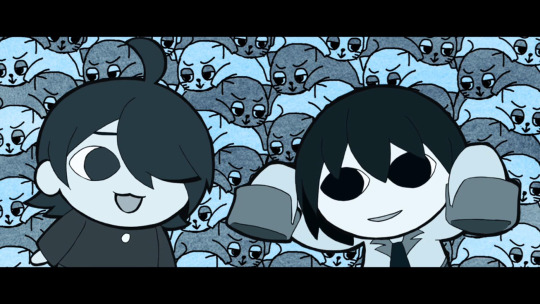
Hi! I was wondering if you could write a meta about Ougi from the Monogatari series.
It’s impossible to talk about one of them without talking about the other, so let’s discuss the unique relationship between Ougi and Araragi underneath the cut, the special relationship between a boy and his shadow.
1. Character Concept: The Jungian Shadow
There’s a lot that can be discerned about Ougi just from the type of character they are. Their relationship with Araragi defines them entirely, without Araragi there is no Ougi.
Ougi’s design is intentionally meant to parallel Araragi’s. Araragi has a very bland light novel protagonist kind of look to him (hence why he never gets any cover art) his only distinguishing feature is that his hair is styled to cover one eye at almost all times. This is because Araragi’s primary character trait is obfuscation looking at things through only one eye you are never going to get the entire picture.
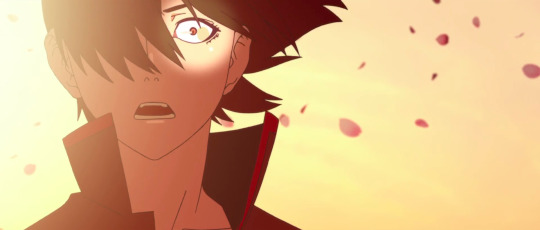
If Araragi’s character design is plain and normal, because that is what the primary protagonist type of these kind of series are an ordinary high school boy, then Ougi’s is the opposite, their design is attention grabbing and unique. If Araragi is normal, Ougi is visibly abnormal, you can already tell there is something subtly off by looking at them. What Araragi hides underneath the surface, Ougi is.
The primary feature of Ougi’s face and the one you notice immediately is their eyes, large, dull eyes, which are the focus of their entire face. Ougi is always shown staring forward with those eyes, unblinking, directly at you. It’s symbolic, eyes are symbols of insight, if Araragi obfuscates then Ougi sees everything. Ougi also wears the Naoetsu high girls uniform. They take the appearance of what Araragi cares about the most, a girl that he can save. Their skin is pale, and their hair dark, which could mean two things, either black and white, light and shadow kind of thinking that Ougi represents or, it’s just supposed to make them look like the kind of ghost that is common in Japanese horror.
Finally, Ougi’s sleeves are so long that their hands are almost never shown. This indicates two things, one human hands are signs of intimacy. What are your hands for? is a pretty famous quote from Evangelion, by never showing their hands Ougi cuts off intimacy because they exist as a symbol of isolation. The next is that Araragi is characterized as someone who always reaches out a helping hand, whereas Ougi is the opposite they stress individual agency and often leave others like Nadeko to their own fate. They may orchestrate things from the shadows, but ultimately Ougi never directly acts, and let’s the characters decide to step off the cliff all by themselves.
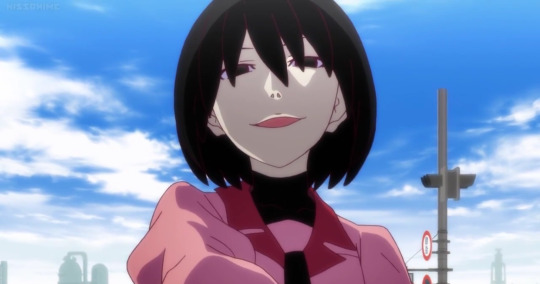
The fact that Araragi a boy, makes Ougi appear as a girl is also a play on binary gender. Ougi is technically genderless, but they appear as a girl initially because themes of binary opposition, and black and white thinking are at play in their character. Araragi is someone who tends to see the world in a binary way. Light and dark, black and white, male and female, they assume there is some kind of proper order to the world that needs to be followed. When Araragi begins to let go of these ideas Ougi is freer to express their gender any way they like.
A binary opposition (also binary system) is a pair of related terms or concepts that are opposite in meaning. Binary opposition is the system of language and/or thought by which two theoretical opposites are strictly defined and set off against one another.
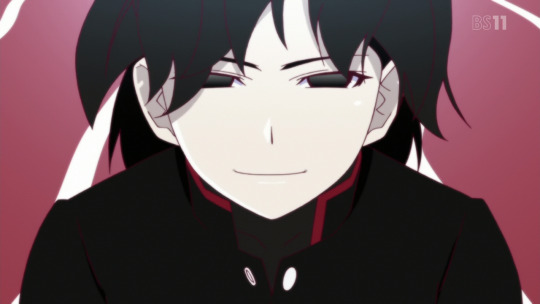
Ougi is based primarily on two ideas. One of them is a pretty obvious reference to the King of Distortion from Boogiepop, which is the series which started what we now call ‘Light Novels’ in Japan by popularizing urban stories with heavy sci-fi or fantasy elements. Araragi even directly references the king of Distortion.
“Tell me, what are you thinking about now...?” “Don’t suddenly become the king of Distortion.” Out with the cool quotes, scolded my sister. I deeply reflected on it. (Nekomonogatari White).’
The king of Distortion is a character who’s physical appearance and personality changes with every character they interact with, and who is able to enter the dreams of other people and see the desires in their heart after which point he makes an attempt to correct them.
While the King's personality changes with whatever person's form he is taking, in general, he seems to share a soft-spoken, calm and collected attitude each time, always seeming confident, most likely because of his knowledge of distortions in the hearts of each person's subconcious he enters. He claims his goal to be to 'turn the people's suffering into gold', which involves having people deal with their inner turmoils and coming to terms with them, which is why Boogiepop does not consider the King an enemy of the world, as he doesn't truly do anything particularly villainous.
King of Distortion like Ougi is also born from a single character’s regrets. The King of Distortion was born the moment Shirou Tanaka arrived at the Moon Temple. The main cause for the King's creation was the pent-up regret Shirou felt after entering a relationship with Naoko Kamishiro even though he didn't love her, figuring that he would just develop feelings for her later. After the girl's death, Shirou's self-hatred grew as he realized he wasn't particularly affected by her death in any real way. These feelings were also amplified by the fact that he knew about Akio Kimura, someone who truly loved Naoko, and deserved her way more than himself. These complex feelings of his manifested as the King of Distortion, a being born from Shirou's MPLS evolution.
King of Distortion is an entity born from repressed regrets and self hatred, what a character refuses to acknowledge about themselves or confront. Therefore, both King and Ougi are Jungian shadow archetypes.
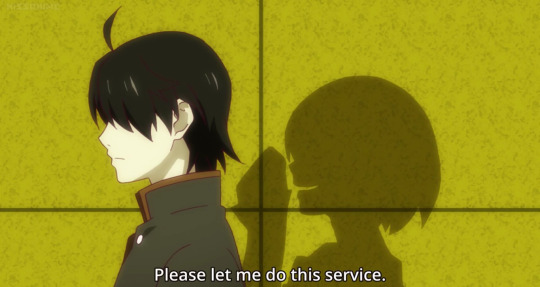
Both as one, one as both.
One is both, both are one.
The Niounomiya siblings with their slaughtering magic.
He and she pass their time in the same body.
Passing their shuttered time.
Passing their shuttered space.
She is Jekyll, and he is Hyde.
One as both, both as one.
Both are one, one is both. Hitokui Magical - [x].
Robert Louis Stevenson wrote the now famous tale, The Strange Case of Dr. Jekyll and Mr. Hyde, a story famous for its astute psychological insight that “Man is not truly one, but truly two.”
In Stevenson’s novel, Dr. Jekyll is a well respected doctor who cares deeply about the admiration of others and strives to be a good human being. In his laboratory he concocts a potion that when ingested transforms him into Mr. Hyde a primitive, unruly and destructive man. Reflecting on the nature of his transformation, he discovers a truth about the nature of a human being.
“I learned to recognize the thorough and primitive duality of man; I saw that, of the two natures that contended in the field of my consciousness, even if I could be rightly said to be the either, it was only because I was radically both.” [Source.]
The shadow exists in a dual relationship with the persona, developing in turn with it. In Jung’s terms the self, is the sum total of the psyche. Both is one, and one is both.
The persona comes from the latin word for “mask”, it’s the elements of personality which arises “for reasons of adaptation or personal convenience.” [Source.] It’s a simple idea, the way you talk around your friends is different from the way you talk in front of your grandmother. People are constantly choosing consciously which parts of their personality to show in front of others, especially in relation to how they would like to be perceived. It is a performance, but that does not mean it is not real. Every part of the identity matters.
It leans heavily on embodying only one’s best qualities, leaivng all those negative traits which contradict the Persona to form the “Shadow.” Jung called the shadow the part of the psyche the unconscoius aspect of the personality. Because one tends to reject or remain ignorant of the least desirable aspeccts of one’s personality, the shadow is largely negative. It consists of everything which exists outside of the light of consciousness, but it can be both positive and negative. “Everyone carries a shadow”, Jung wrote, “And the less it is embodied in a person’s life, the blacker and denser it is.” The shadow is unscious, things which our mind experiences but we cannot control, dreams, desires, instincts.
Without a well developed shadow, a person can easily become shallow and extremely preoccupied with the opinions of others, much like how we see Araragi act in Monogatari. Jung believed that, not wanting to look at their shadows directly, many people project those flaws onto other people.
In terms of literary theory then, the Jungian Shadow archetype is a character who is made up of all the flaws that the protagonist refuses to confront. They challenge the protagonist merely by existing, because the protagonist wants to look away and leave those qualities unacknowledged. Often, they are an antagonist merely because the protagonist projects all of the flaws they cannot see into themselves, onto that other person.
2. Araragi Koyomi - He Obfuscates
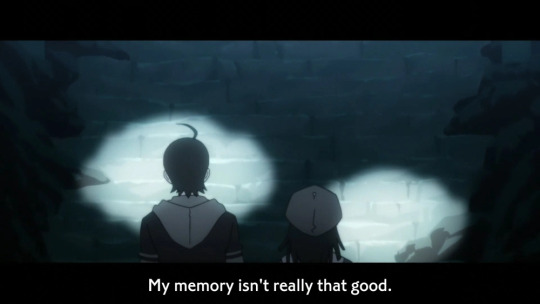
It is impossible to see the shadow without the light. It is impossible to describe Ougi without first talking about Araragi Koyomi. Just like Ougi, let’s start with the origins of his character. While this is just my own personal speculation I’m not NisioIsin, Araragi has always read as written in response to two things to me: First Ii-chan, the protagonist of his first series Zaregoto, and second harem protagonists in general.
II-chan and Araragi are both very flawed and non-confrontational human beings, but whereas Zaregoto is a story about how II-chan really does not want to change himself and instead just kind of wants to stay treading water, wants to never cause any more ripples, wants to hold onto the fragile sense of self he has Araragi’s is a story of a bad and hypocritical, shallow kind of person striving to grow up and become a good person, acquire depth.
The stereotypical harem protagonist is this, a plain guy with no personality who somehow gets girls to fall all over him, often for showing them the bare minimum of kindness. Monogatari is partially a deconstruction of harem series because it shows the kind of circumstances that would cause all these girls to fall all over one guy, literally they are all so deprive of affection that the smallest show of kindness does actually make them fixate on Araragi.
The thing is Araragi does have a clear personality. He is very cynical, he’s judgemental of other people, he really likes to snark. Part of the reason he likes talking to Senjyogahara so much is he can be meaner, and sharper tongued than he normally presents himself as around people. He has traditional black and white views of justice. He tends to meddle. He is observant, but his style of thinking is flawed because he tends to jump to conclusions quickly rather than thinking out the details slowly and methodically. He’s almost constantly anxious, but usually responds to the anxiety with avoidance. However, a lot of his more distinct personality traits sound more negative rather than positive, so Araragi has a version of himself he presents to others who he is less close to. This ‘self’ is much more vague, and wishy-washy, very go with the flow. Despite the fact that Senjyo and Hanekawa both comment that Araragi is well known among the students as a delinquent, Araragi himself says that he’s a typical high school student with a completely normal personality. He defines himself as vague on purpose, that sole purpose being to appear as more acceptable to others, because like an ego that refuses to acknowledge his shadow Araragi is very shallow and defines himself entirely on the opinions of the other people around him.
He is lacking a sense of self, or rather that sense of self eventually escapes from him when his shadow runs away Peter Pan style and becomes Ougi.
Araragi has three primary character flaws that manifest in the form of Ougi, Araragi is a hypocritical altruist who only cares about weak girls that need to be saved, Araragi obfuscates, and Araragi only thinks in black and white.
Araragi is not someone who helps people because it is the right thing to do. He does not do good deeds because they are good. He only helps others because there is something he gains out of it. One thing that’s important about Araragi is that he has a cripplingly low self esteem, to the point of self harm, self flagellation, and even suicide attempts.
He literally says so when he finds Kiss-Shot’s body, his first response is not to call for help but rather to try to let Kiss-Shot kill him, apologizing for living such a worthless life until this point. It’s not just that Kiss-Shot was in trouble, Araragi also made it about his own self loathing.
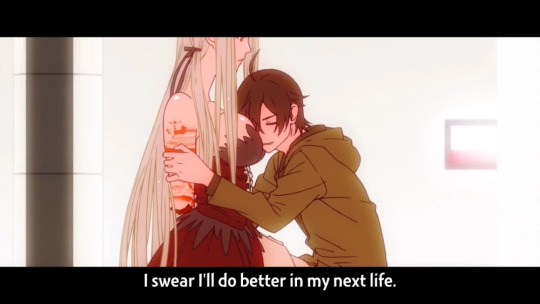
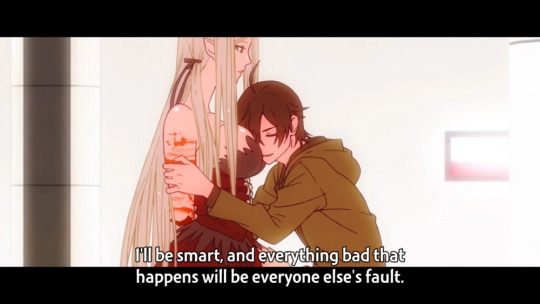
Araragi seems selfless to a fault, but he’s actually very self obsessed. While it’s true that Araragi desires to be a good person, and improve as a person, his methods for self improvement are faulty. He’s obsessed with appearances, and it’s more like he wants the appearance of a good person rather than actually having to put in the work at first. He wants to feel like he’s saved others. He wants to feel like he is someone worth something. He saves others because it increases his self worth, and also once again he gets something out of it. Araragi saving women that are weaker than him makes him feel special, like somebodyy needs him.
He wears the persona of a hero, rather than actually trying to be one. It happens again and again in the series. Despite the fact that Araragi actively does heroic things literally all the time, he also denies any role of being a hero because he does not want the responsibility of being one. Araragi wants the world to be burger king, he wants to have it his way. He wants the best of both worlds, Hannah Montana style. He wants to save girls, but he doesn’t want to be their hero and be entirely responsible for them.
“Araragi-kun, even if you can become a star, you can’t become a hero.” “I can’t become a star.” I shook my head. “I can only become a vampire.” And I even failed at that. “I see.” So you’re not going to be - my hero.
Nekomonogatari: White (Hanekawa and Araragi)
Take his actions in Nekomonogatari. Araragi claims it’s impossible to be a hero, he says that Hanekawa cannot be saved and calls for her to take personal responsibility and face everything that is wrong with her life. However, rather than trying to just support her with that difficult task Araragi immediately jumps to self harm.
It’s impossible for Araragi to become a hero, but he can swallow a katana and then trick Hanekawa into killing him because that is somehow easier than facing his feelings for Hanekawa head on. Araragi prefers bloody, painful self harm to the terrifying ordeal of being known. Araragi knows that Hanekawa is in need of help, but the fact that she is such a messy person different from the person he originally saw her as, makes him afraid of her.
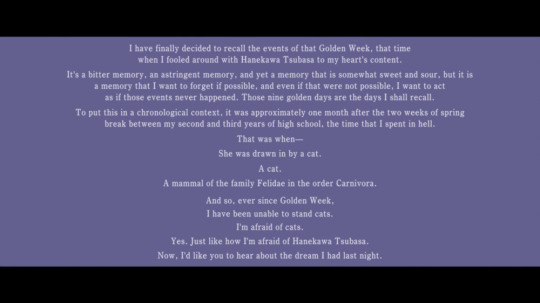
The thing is human beings are really sloppy. They are a messy gray, and Araragi wants to save them, but he really is just a kid out of his depth with a lot of things. He sees the abuse of Hanekawa’s household, and because he’s literally never even encountered an abusive life he gets so terrified that he runs away screaming. He does care about Hanekawa, but she’s far too complicated for him. He does not even want to touch that mess. It’s much easier for him to see Hanekawa as a hero, all black, or all white, then try to attempt something he does not know how to do and could screw up Hanekawa even worse.
Once again while it is not Araragi’s responsibility to fix an abused girl, and it makes sense a normal high school kid does not understand coping with abuse at all, Araragi at the same time wants to help her. Instead of just admitting that he can’t do anything for Hanekawa, he play-acts at being a hero.
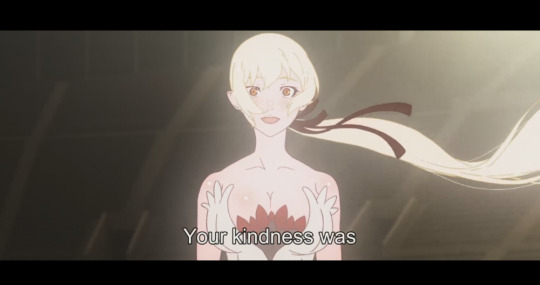
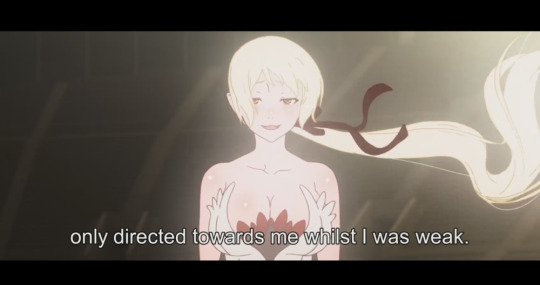
Here’s the thing about Araragi, have you ever once seen him try to save a boy? He only cares about helpless girls because those are the kind of people that heroes save. He does not care about people that are stronger than him, because then he is depending on them rather than the other way around. Araragi only interacts with about three male characters in the story significantly.
Oshino, who is an adult figure that Araragi aspires to be like, and then Kaiki and Seishirou who he both views as rivals for the two most important girls to him Senjyogahara, and Seishirou. Do you notice there is a far different tone in Araragi’s interactions with Seishirou and Kaiki? Araragi absolutely refuses to see Kaiki as anything other than a villain, and while Seishirou is clearly a victim, Araragi cares very little about actually saving him and instead prioritizes competing with him over Kiss-Shot.
Once again this is dude psychology that is present in Harem series. Did you notice if male characters do show up in harem series they are oftentimes, either comic relief, they are terrible people for the main character to look good in comparison, or they are old men mentor types. That is because any other man who would exist in a harem series is automatically competition for the girls. Araragi does not want to compete, he does not want to feel inferior to anyone else, because he always feels inferior all the time therefore he never has any male friends.
Therefore it’s hypocritical altruism, while Araragi is willing to help and that’s a good thing, he also never once helps unless there is something he gains from it. Even if it’s a chance to exercise his self loathing. Once again Araragi’s self loathing is incredibly harmful, he literally gets bones broken, limbs severed, and organs torn out almost every time he helps someone. Not only that but it’s always the first solution he jumps to. This is not the behavior of a healthy person, this is the behavior of someone attempting to punish themselves. Helping these girls by martyring himself is an act of attrition for Araragi, because he believes he deserves pain for all of his hypocrisies, but once again it’s still self obsession. Just hating yourself, just beating yourself up, is different from having to do the actual work of facing yourself and picking yourself up. Araragi will always choose dishonesty over honesty, obfuscation over seeing things clearly.
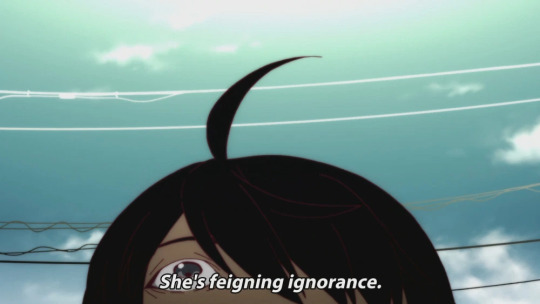
Araragi’s primary strategy of dealing with these many hypocrisies and contradictions in himself, and keeping his ‘ego’ in balance has always been obfuscation. Araragi is observant, but he presents himself as ignorant. He always goes on claiming how stupid he is, and how he’s nothing more than a worthless washout.
This is because Araragi was raised with an overpowering sense of responsibility. While his parents are not necessarily bad parents, they are police officers. He was raised made to feel responsible for things like justice, saving others, and especially made to feel responsible for his own flaws. Police officers are also symbols of justice, who as human beings often fall far short of the law and authority they are supposed to represent, because symbols are symbols and humans are humans.
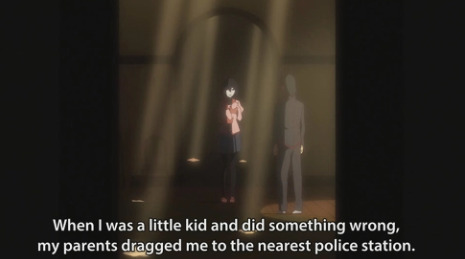
Therefore, what Araragi wants to avoid at all costs is feeling responsible. He wants to be important, but he never wants to take the responsibility of actually being important. This is his immaturity, the part of him that refuses to grow. For Araragi, if situations are too complicated for him to handle, or he fears his meddling will only make things worse and therefore he will be indicated as responsible his response is to just avoid it entirely rather than struggle or try.
This is shown in the case of Sodachi Oikura, once again someone that Araragi knew about and sympathized with but at the same time could not comprehend. Sodachi lived in horribly abusive circumstances, and both times Araragi encountered her he was a child. Araragi at the same time takes far too much responsibility, and far too little. It’s completely understandable that Araragi a middle schooler had no idea what to do to deal with what was obviously an abusive household, most adults are pretty useless when it comes to handling abused children. Yet, at the same time Araragi avoids any responsiblity whatsoever, he just forgets about Oikura claiming he has a bad memory depsite encountering her at three different significant parts of his life. Rather than struggle and fail, it’s better for Araragi to just not know anything at all therefore it can’t be his fault.
When Ougi drags Araragi through Sodachi’s case, Ougi ‘deduces’ everything, but Ougi’s catchphrase is I only know what you know. Ougi cannot have come to a conclusion that Araragi did not already know or was not capable of figuring out on his own, Araragi just did not think of those things because it was too painful to think.
This is also present in his dealing with other characters. There are several characters who have heavy romantic crushes on Araragi while Araragi is already in a relationship, Nadeko, Hanekawa, etc... Rather than ever just going through the awkward interaction of rejecting them it’s much easier to just pretend he never even notices their affections. Therefore we see him hypocritically, have a girlfriend, at yet at the same time constantly hang out with other girls who have a clear attraction to him and romantic feelings for him and never do anything about it.
Nadeko turns into a god because of obfuscation, both on Araragi’s part and on Nadeko’s. Nadeko is called out for what a hypocritical person she is never wanting to face anything directly, but that behavior is only a reflection, a foil to Araragi’s own, hence why Araragi was never able to save her.
Once again, Nadeko clearly has several problems with her personality, and she also blatantly hits on Araragi several times despite one being a middle schooler, and two Araragi having a girlfriend. Rather than just reject her outright, or acknowledge these parts of her personality, Araragi chooses to ignore everything and reduce her to being a cute girl. Nadeko puts on the act, and Araragi perceives. He then ignores all of her feelings, until they repress more and more and then bubble out into a jungian shadow expression that is Snake God Nadeko who just indulges on all of her instincts and desires and gives up conscious thought and her persona completely.
Ougi always mocks Araragi has a helpless fool, because that is what Araragi wants to be, helpless, foolish, and therefore not at fault when there are unintended consequences of his actions.
Finally, Araragi only thinks in black and white. This is also part of his obfuscation, he never wants to acknowledge how complicated people are. When he’s forced to confront the ugly side of people he almost always looks away.
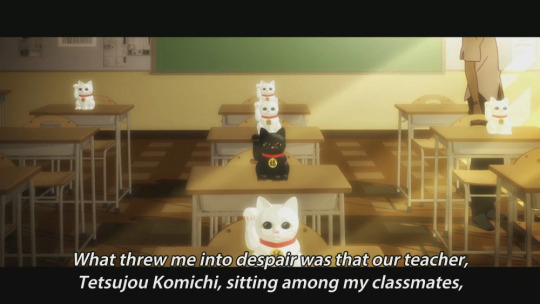
Black cats, white cats, hmmm, I wonder what that means. Araragi was only disappointed with the idea of justice, because he wanted to believe in it in the first place. He wants to believe that things like heroes can exist, and that his black and white perceptions of the wolrd are real. Araragi craves that order more than anyone else, perhaps even more than his younger sisters who just play at being heroes of justice. The reason he becomes so disillusioned is because he expects there to be an order of things, for their to be roles just like in a story, for their to be a sequence of events with meaning.
Araragi expects narrative rules to apply to real life. For life to have meaning. That is why he is a story teller. There are monsters and oddities, and humans with a clear line between them, despite the fact that Araragi himself is someone who blurs these lines by existing as a quasi vampire. Araragi’s life is a story that he tells himself, and that’s why it’s so important that his perceptions are so off. In Tsuki he even gets called on this twice, he calls his increasing vampirism punishment instead of just consequences for his actions and he’s told not to think he’s so special that god would go out of his way to punish him. Tadatsuru asks why they are facing off like this, why Araragi is protagonist and he is antagonist.
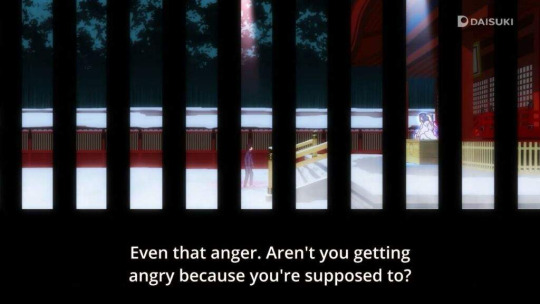
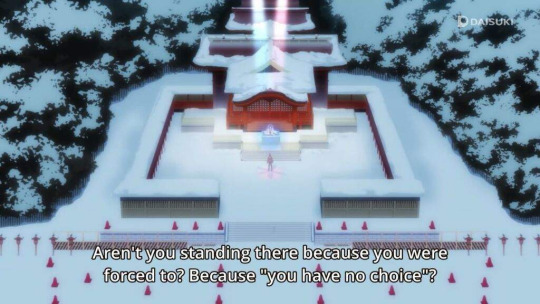
Araragi does not like acknowledging how sloppy the world is, because that makes him feel insignificant and weak. It would make anybody feel that way, because it means acknowledging that we are not as in control of things as we would like to be.
3. Oshino Ougi - They Reveal
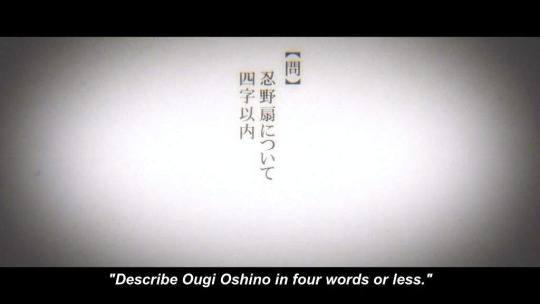
Ougi Oshino is Ougo Oshino.
They are a vague existence, Araragi refuses to define them because defining Ougi means defining themselves and that kind of confrontation is the last thing Araragi wants.
Ougi Oshino is born out of a desire for Araragi to punish himself, the same way he always seeks external punishment by allowing people to beat him up and rip out his intenstines. Rather than confront what is inside of him, Araragi externalizes it and confronts it as an external force which he projects upon.
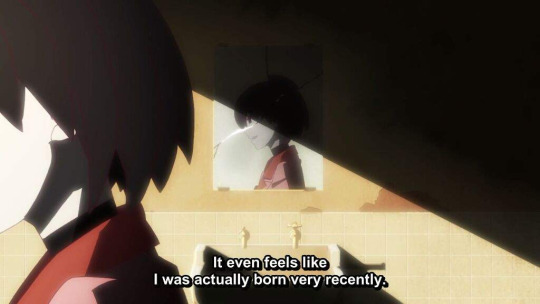
Ougi is a shadow born from the light of Araragi’s ego. It was not the darkness that created them, but rather Araragi himself and the shadow he cast. Therefore while Ougi can be seen as a corrective force, they actually embody all of those flaws that Araragi has, and their own character traits are always in response to those flaws.
Wheraes Araragi is a hypocritical altruist, Ougi is someone who exists to fix people’s mistakes, or punish them for their mistakes rather. Despite manipulating them, Ougi also ultimately leaves them up to their own fate. He leads them up to the cliff but does not push.
Ougi is a hypocritical fixer, because while he seems to be punishing others for their mistakes he really only exists to punish himself in the form of Araragi. All of the ‘mistakes’ he corrects are just Araragi’s own mistakes foiled in other people.
Nadeko is a foil to Araragi, she represents his own feigning of innocent and being unknowing. Kaiki is a foil to Araragi, he represents how much of a fake Araragi is by pretending to cling to ideals of justice and saving others but also denying them as well. Sodachi is also like Araragi, they both prefer to wallow in misery than try to work towards their own happiness. Araragi even says his famous line with his relationship with Shinobu, an ending where everyone is miserable, where nobody gets what they want. There are serious problems with his current relationship with Shinobu, a power imbalance, and both know they cannot last this way forever but rather than attempting to fix their relationship they both cling to the way thing’s are.
Repression and obfuscation is always favored over directly addressing the issues, especially the things which Araragi probably cannot control, or fix, like the complicated nature of abuse. Ougi claims they operate out of some imaginary set of rules that totally exist, but once again Ougi is the hypocrisies of Araragi laid bare. They are every bit the hypocrite that Araragi is.
They are just punishing other people who reflect Araragi’s negative traits. Those who do not acknowledge their shadow, will project their flaws onto other people and see themselves in other people in order to cope.
Ougi is made up of Araragi’s repressed desires. They are a girl he wants to save, which is the only type of person Araragi interacts with. At the same time, they are also connected to Oshino, who is Araragi’s model in the series for adulthood and maturity. Oshino who is always able to figure things out, and very self-collected often making fun of Araragi for his youthful excitement and his naivete for not knowing much about the world.
While Araragi presents himself as an idiot, Ougi is intelligent an capable of figuring things out from scraps of information. Araragi jumps to conclusions, Ougi is deductive and a good thinker. Ougi Oshino already knows Araragi better than himself, therefore Araragi does not have to carry any of the burden of self reflecting, or making himself known to other people around him.
During Ougi and Arraagi’s first meeting in the anime, he hallucinates that the classroom that he is locked inside of floods with water. The depths of the water, the shadow, dreams, these are all the realm of Jung. If the conscious mind is the water’s surface, then the subconscious is its depths.
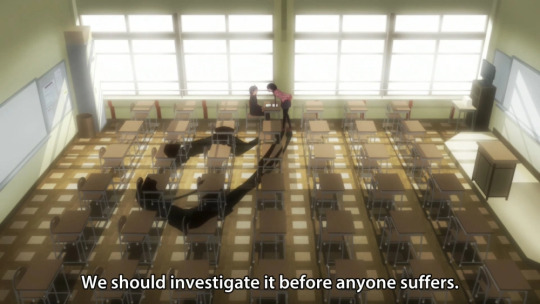
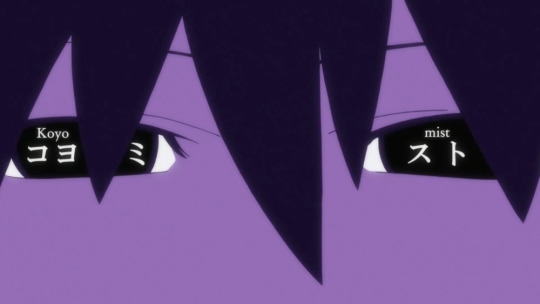
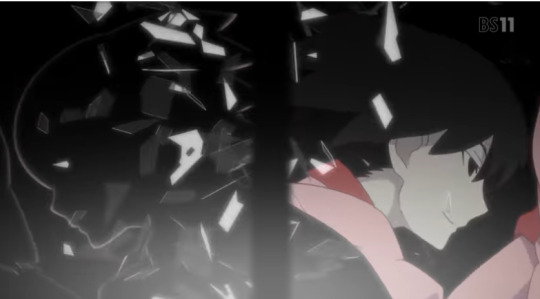
Araragi obfuscates, whereas Ougi reveals the uncomfortable truth. Ougi always positions themselves as a detective. In the realm of stories, it is the detective who makes the big reveal at the end. After all Ougi even says when they are locked in the room together, because there is no famous detective that Ougi themselves will play the role and announce the culprit.
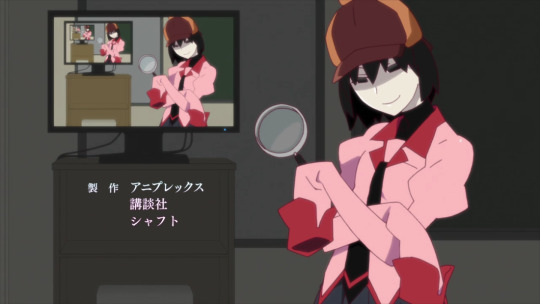
However, Ougi’s reveals are just as hypocritical as Araragi’s obfuscations. Ougi takes the shadow to be representative of the whole self, because they themselves are a living breathing Jungian shadow, but just like Jekyll and Hyde man is both. He is not one or the other, he is both at the same time. Ougi always act with the assumption that there is some kind of truth to be revealed, that this is just like a detective novel where there is a reveal waiting at the end.
Ougi takes the repressed desires to count as the “truth” of the whole mind, and ignores the conscious mind entirely. Therefore, in their view Nadeko is only capable of being a selfish cute girl who sees herself as a victim, Hanekawa is only something scary which Araragi must avoid. They at the same time as Araragi both read the same black and white narrative of the world. They do not care at all for the persona, or how people choose to present themselves. Desipte what Kaiki said to Nadeko that people can choose to be whoever they want to be, and they can try as many times as they like.
Ougi also views themselves as inhuman, and therefore incapable of doing anything, or defining themselves as anything outside of their role. Ougi is in a way, just as repressing of themself as Araragi is. They even lament this in front of Tsukihi, that once the detective reveals the mystery the novel is over. That if anybody would know the truth of them, they would come to hate them because they are abhorrent.
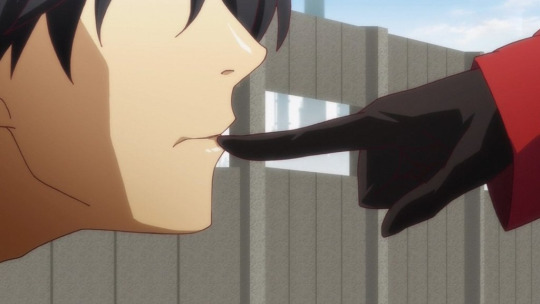
Ougi by repressing concious thought, silences other people and what they have to say about themselves. The only thing that matters is the repressed, what Ougi dictates as the truth must then become the truth. It’s just as much a limited way of saying the world as Araragi’s is. Hence Ougi’s famous catchphrase, I don’t know anything, you’re the one who knows. Ougi sees themselves as a person fundamentally incapable of knowing anything other than outside the bounds of what Araragi already knows.
Which is finally where the black and white thinking comes in. While the two of them seem like polar opposites, their views of the world are actually the same. Ougi wants what Araragi wants, for the world to exist like this is a story. For there to be roles, and order and most importantly meaning. The same way that Araragi just ignores things that fall out of step with their roles, when people contradict the way Araragi sees them he just pretends to be oblivious rather than see them as complex human beings. Ougi actively goes out of their way to punish people, for not playing the role in the story they were supposed to play. He acts like a corrective force, pushing people back into their roles. His wrongful assumption is not that people improve by “correcting mistakes” but rather there was a proper path in the first place. That there was a hero’s journey they were supposed to be going on. There is no path, there is no meaning, it’s all senseless but Ougi exists out of a desire for things to be sensible.
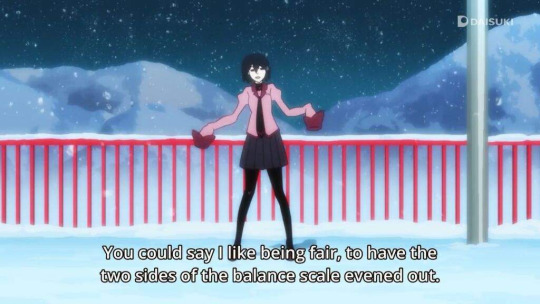

Ougi exists as Araragi’s opposite, because Araragi assumes that things like binary opposites exist in the first place. Heroes and villains, crime and punishment. They both believes these things exist in a fundamental order in the world, and they are not just made up values that humans invented and give meaning to.
“Let’s not joke. Virtue is the antonym of vice, not of crime.” “Are vice and crime different?” “They are, I think. Virtue and vice are concepts invented by human beings, words for a morality which human beings arbitrarily devised.” (No Longer Human, Osamu Dazai)
For both of them clinging to these hypocritical beliefs are better than the alternative, admitting to their own helplessness in the face of a world that is mostly indifferent to them.
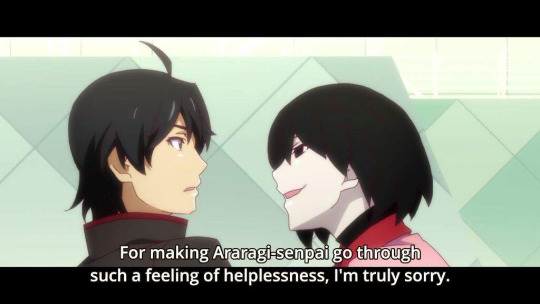
That’s why, when they are separate both of them choose to stick to their ultimately restricting and punishing roles, as protagonist and atagonist, persona and shadow, hero and villain, rather than just trying to acknowledge themselves and live as people.
Both is one, and one is both. Araragi Koyomi and Oshino Ougi have a relationship that ultimately results in not antagonism, but rather union and acceptance. Just like the King of Distortion is not an enemy of mankind in the enemy, Ougi was never an enemy to Araragi in the first place. Araragi never needed to hate himself or punish himself. The true path forward lies in union and acceptance.
You can never be anything more than yourself, nothing more and nothing left.
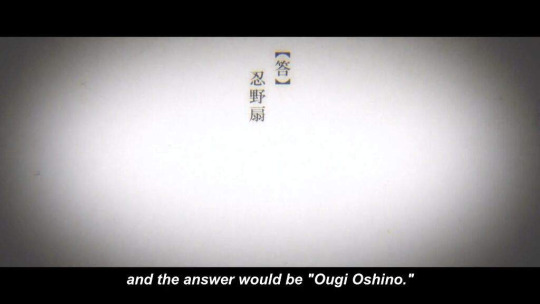
74 notes
·
View notes
Text
Destiel Meta - an outsider’s perspective
I’ve been reading meta for about a year, but now I wanted to add my own post regarding it.
I don’t really see things when I first watch episodes, I don’t get mirrors or parallels or pay attention to background details like wallpaper or neon signs or anything like that. I’m not good at analyzing things or interpreting it, not in literature nor film, I don’t do something in this area professionally or studied it.
However, there are some things that jumped out so much that even I thought “Hey, that’s something!”.
Part 1: Mirrors
Seriously, mirrors? You’re telling me that it’s a known method to present mirrors to characters, that they can be used in subtle or totally obvious forms, and they can tell you a lot about the character that’s being mirrored just by existing? Wow that’s so cool!
14x300: In the first scenes when my friend yelled “Look! they look like Dean and Cas!”, I wasn’t 100% sure if that’s what was going on, but oh boi at the end of the episode it was crystal fucking clear. Three people next to each other, the one on the right taller than the others, one is wearing a jacket resembling a trench coat, one is wearing plaid. Trenchcoatjacket and Plaid are holding hands.
We noticed Plaid’s crush on Trenchcoatjacket the whole episode, it was so obvious! Hm, what else was there in resemblance? I remember the taller kid was pretty nerdy, and Plaid stole the Impala at one point, so it’s pretty clear we have Sam and Dean here, which leaves Cas for the last person, and it fits so well! Thats awesome!!
Apart from “Lebanon”, the episode ‘Mint Condition’ basically taught me how they use mirrors and that I should pay attention to them right now. They pointed out who was Sam and Dean, then resumed with the plot and I sat there thinking “Oh!”.
My friend explained to me how the ghost of that episode relates to John Winchester, and honestly if you follow the train of thought about mirrors that the episode presented to you, it’s pretty easy to get there.
Dreamhunter: The confirmed ship with two girls, ah yes! Again, I don‘t really pick up on visual cues or background stuff, but when Kaia said to Claire “I’ll go with you,” I had flashbacks to the season 11 finale immediately. I mean, using the exact same dilagoue? But alright, maybe they’re gonna keep playing it as a cute subtextual crush or how you call it, because neither of them says “You’re my crush”, so-
Oh, wait, Kaia was also stabbed in front of Claire who screamed “Noo!!”, that’s another striking resemblance. Hm.
Oh, Dreamhunter is confirmed to be a couple thing? Neat! So does that mean all the DeanCas stuff is romantic? Because y’all used the same dialogue and plot.
Part 2: Dean’s pining (season 11)
To be fully honest here, I didn’t understand season 11. At all. I didn’t get the whole Amara thing, why was everyone talking about pining? Dean told us that it wasn’t about desire with him and Amara, just a weird fixation, but still, the lady in the senior home told Dean that he “was pining for somebody else”. That makes no sense!
Unless it’s true? Dean didn’t pine for Amara, he tells us that, but everyone’s still talking about pining, therefore the topic of pining is important. Dean x Amara wasn’t romantic, that’s clear from what Dean told us and how he behaved, so no pining.
The only person left he could pine for is Cas. The dude who let in Lucifer, who Dean’s worried about, who Amara touches and she knows where Dean is? That’s..interesting. I’m still kinda confused, but some things are clearer now. No romance between Dean & Amara, but pining is still a theme, and only Cas makes sense. Got it.
Part 3: Cas’ endgame as being human
I wanted to include this because I’ve had this headcanon for years, then saw the meta community talk about it, and honestly there’s one scene to watch and it’d be clear that Cas wants to be human.
“We need grace-” “He can have mine”. 14x08
Alright dude, you’re so eager and ready to throw away your grace? Okidoki.
To go back in time, everyone always had these TED talks about how Cas loves humanity and loves humans and human things, that he feels stuff (season 4 yall, it’s been a while), that he compliments Hannah with things that “are human”. He doesn’t get along with other angels because they’re different than him, or they don’t understand his love and devotion for humans. He spends pretty much all his time on earth, around humans, because he loves them, and one in particular.
To quote Metatron, “He’s in love with humanity”. Do I need to add more? No? Fantastic, because this post is long enough already.
Part 4: Random things in no particular order
Episode 12x12, because come on. Some people took the gifs of Cas’ deathbed confession and connected them to the shots before, showing you where everyone’s standing, who Cas is looking at, and it’s so bloody clear. Don’t get me started on the singular vs plural “i love you” because I literally don’t have to, it’s right there.
“I could go with you”- season 11 finale. Cas, ready to die to accompany Dean on the suicide mission to save the world. He wants to ease Dean’s fear and be there for him until the very end, without hesitation. Castiel really fucking loves Dean Winchester. Wow.
That’s it I think? Those are the top things that jumped into my face when I watch the show, things I didn’t have to read other people’s thoughts on to understand what’s happening. :)
To finish this up I want to say something about meta writers. I didn’t start out reading meta, I didn’t really care for details and background stuff and took the show as I saw it, which is why I shipped Destiel immediately because there were enough things so blatantly obvious to me that I just had to. Then I found @tinkdw, then @bluestar86, @dotthings, @occamshipper, @postmodernmulticoloredcloak and all the other bloody amazing meta writers, and boom! A whole new world!
I started a series rewatch, read the posts for the episodes or seasons, paid more attention and there was so much to see and notice! It gave me joy in watching SPN in a time where I was kind of burned out because I had just discovered the bad side of the fandom and was a bit hopeless, for my OTP and the show itself. It gave me friends, and interesting conversations, but more importantly: These people helped me be realistic about episodes, upcoming episodes and PR stuff. “PR is not showrunning” was a strange concept to me before they showed me what it meant, and I vividly remember being in tears before all this after some PR material promised amazing things but failed to deliver.
These people are so good at predicting what’s going to happen because they read the fine print and understand it, pack it up and show it to us who either can’t read the fine print or dont notice it. They help fans to control (?) their expectations, to soften blind excitement over promo shots or interviews with people who have either no clue what they’re talking about (Jensen bby, i love you but what are you even saying?) or are purposefully exaggerating things.
They saved me from so much disappointment, they improved my fandom experience and changed my feelings for the show and how I watch it. There are so many interesting things to discover, things that confirm theories and explain plot points. I haven’t been disappointed in a new episode because of PR or rumors since I’ve met them, except ep 300 but that’s...a whole other thing. They were right about that too, though, and I didn’t listen. Catch me crying at four am because of it.
I love those people immensely, and I’m so thankful for them. They take the time to write all these essays about the show, all you have to do is read them.
A toast to meta writers! Consider this your personal love letter.
Kisses,
Jana
247 notes
·
View notes
Text
Far Cry 5 Theory #3- Faith And The Greek Goddesses
Hi all, and welcome to the third in a series of Far Cry 5 meta posts! Today, I’m talking about the often sadly overlooked, beloved little sister, Faith! It’s not an original theory this time, instead I’m building on already existing and acknowledged symbolism within the game!
This one is 1972 words, so another long one, but I hope it’s interesting!
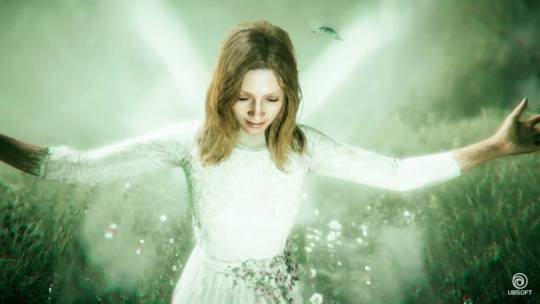
Far Cry 5 is laden with Christian symbolism- talk of God, baptism, souls and sins- but there is one very interesting example of where this trend is broken. This moment comes within the scene where Faith entices Burke to kill Virgil, and then himself.
As she approaches her victims, she says to the Deputy:
“Do you know what hubris is? Arrogance before the gods. The Greeks saw it as a dangerous form of pride that invoked the goddess Nemesis, who would seek retribution.”
This is the only example in the entire game (and indeed, the supporting materials) where the situation’s religious undertones are blatantly derivative of Greek mythology. And while Faith is heavily under the influence of Joseph’s doctrine and ideology, I feel that this very deliberate reference can shed some light on how she decided to play the new role she had been given.
Not just as a Herald... but as a goddess.
Aphrodite. Cybele. Psyche.
Nemesis.
Nemesis is the Greek goddess of retribution, justice and revenge, a figure who punishes arrogance and pride.
Immediately after making this reference, Faith goes on to say:
“If violence is the only language you choose to speak, I’ll speak your language.”
She directly places herself in the role of Nemesis, deciding that she must combat the Deputy’s violence, their hubris, by retaliating with Burke and Virgil’s deaths.
Faith is the only one of the Seeds who actually punishes the Deputy’s actions.
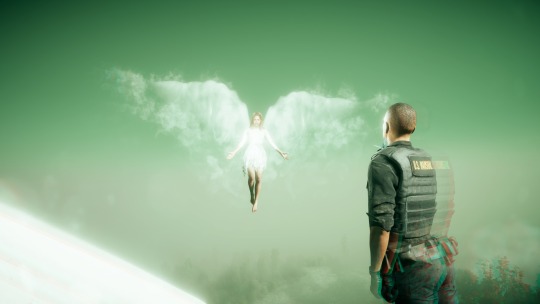
INSPIRATION
Due to this reference, it appears that Rachel took heavy inspiration from the Greek mythology when performing her role as Faith. It has been discussed before (in this post by teamhawkeye and weekend-writer) that she may have learned how to be a Herald from Jacob, since she directly quotes him within the game, and I also think that all of Jacob’s talk of humanity, history and falling empires may have influenced her to look at the ancient societies, to understand the faiths that made their empires so strong.
She would learn of their all-powerful gods and of cruel punishments administered to those proud enough to challenge them- think of the fates of Medusa, Arachne, Marsyas and Tiresias.
And seeing how successful the ancient gods were at eliciting respect and obedience, she decided to put their methodologies into practice.
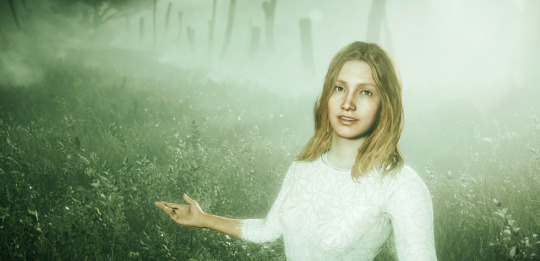
BUT WHY?
Delusions of grandeur.
It’s easy to imagine, that having been once cast out from society, Rachel might become enamoured with her new position as a Herald, as the one Joseph hand-picked to be at his side. She rose from nothing to become a leader, loved and feared. She now held the ability to control people entirely. She was now divine.
It’s pretty likely that power went to her head.
I have been considering the possibility that Faith believes she is supposed to act as a deterrent for Joseph’s own hubris. Joseph would worry that to wield the power he has, and to carry the notion that he is chosen by God, may make him arrogant and tyrannical, and he would need someone to keep his pride in check. Greg Bryk has discussed how Faith is a motherly figure to Joseph- who better to aid him in a battle with his own sins than a parental figure, just as he, as a ‘Father’, aids the atonement of his flock?
But why would Joseph ask her to take inspiration from an ancient religion that isn’t part of the Eden’s Gate doctrine? Why would he raise her to be a godly figure, when he and his brothers were simply prophets?
He wouldn’t.
So maybe Faith, with talk of her divinity as her new form of cocaine, combined Joseph’s request to assist him, her developing delusions of grandeur, and the ancient stories she learned from Jacob, to come to the conclusion that she was special, chosen like the heroes of old?
And so she decided to become a goddess, as evidence of her worth.
Faith wasn’t named by the Voice in Joseph’s original visions like John and Jacob were, and I imagine she’d be aware of that. Perhaps she felt bitter, outcast, not quite part of the group. A Herald, but not a prophet. A Jessop, not a true Seed.
She knew she must have a purpose, after all, she was chosen.
Perhaps she was chosen as a guide for the prophet, so that he might remain humble and loyal to his holy cause?
SO WHAT PROOF OF THIS IS THERE?
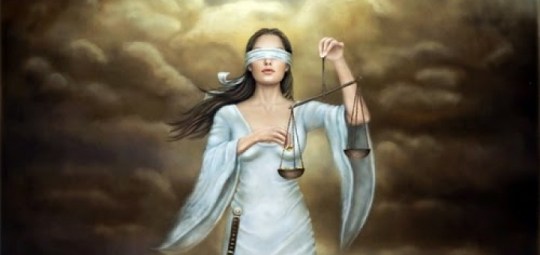
HER ORIGINS
Nemesis is the child of Nyx, the goddess of night, and Erebus, god of darkness. And so it can be argued that she was quite literally ‘born of darkness’. Both Nyx and Erebor were born of Chaos which the Greeks described as a formless, eternal dark abyss between the Earth and sky, or upon which the Earth rests.
In one of Faith’s broadcasts, she can be heard saying ‘Life comes from chaos’.
The Greeks' dark void, Chaos, was worshipped as the very first thing to exist.
It seems too much of a coincidence for her to make this statement, a sentiment not shared by any of the other Seeds, if she had not been influenced by Greek mythology. And it could be that Faith’s belief in this doctrine comes from the parallels it has with her own story:
“Faith flies divine—and Rachel…Rachel gropes around in the darkness. I left her there a long time ago.”
Rachel was born into a world of darkness, by abusive parents. She tried to remake herself using drugs, but still was lost in the ‘chaos’. It was only when Joseph found her that she finally became ‘Faith’... that she became ‘Nemesis’ and came into the light, ‘born’ as the person she was meant to be.
There are also interpretations where Nemesis has no father, which is all the more interesting, considering Joseph’s epithet.
SYMBOLISM
The above depiction of her is especially interesting, as Nemesis holds two of her symbols- that of scales, and a sword. These are the very symbols of her adoptive brothers. We have little insight of how Faith interacts with John and Jacob, but we know that Joseph apparently dotes on her. Perhaps, if she is indeed consumed by the notion that Joseph chose her, made her a favourite, that she feels she has some degree of control over them too?
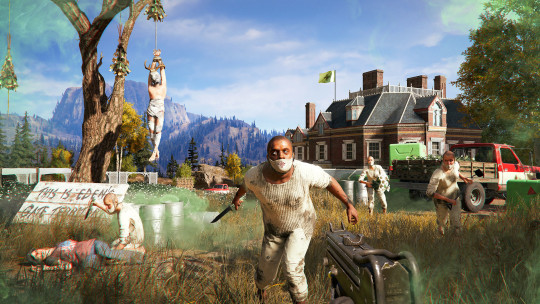
THE ANGELS
Faith appears to have taken inspiration from Nemesis in her manufacturing of the Bliss, and the effects it takes upon those consumed by it.
The Angels are overdosed so heavily on Bliss, that they no longer have free will. This is an irreversible process, and one wonders why such a process is needed, if the Bliss is influential enough upon most people to make them suggestible to the Project?
Well, perhaps Faith suggested it, in reference to Adrasteia.
Adrasteia was an alternative name for Nemesis, and in Ancient Greek, roughly translates to ‘one from whom there is no escape’.
Interestingly, Adrasteia is also the epithet of Cybele, the goddess of childbirth. Could it be that Faith, in a twisted way, thinks of the Angels as her children- a note from a Priestess describes them as ‘extensions’ of Faith- and one very telling phone message, has her saying:
“A baby is a sack of screaming, shitting, crying impulses with no thoughts, no personality, no understanding of the world beyond feelings. It has no soul. You have to give it one. The only soul we ever have, we receive from others. And it is only others who can take it away.”
Writings on Nemesis has also described how she uses "adamantine bridles" to restrain "the frivolous insolences of mortals”- and it wouldn’t surprise me to think that this is why her Angels wear masks over their mouths. There is a suggestion that their tongues have been removed, but why would Eden’s Gate hide that? They are hardly adverse to graphic reminders of their sins?
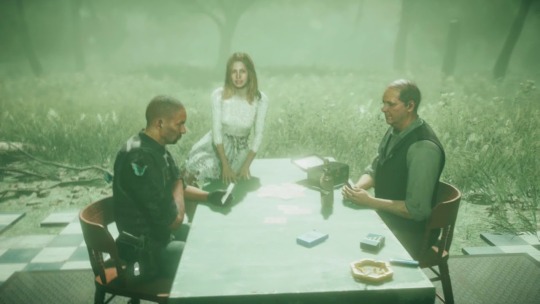
THE SIREN AND NARCISSUS
Faith bears the title ‘The Siren’, a creature from Greek mythology famous for leading people to watery graves by seducing them with their voices, and it therefore can be no coincidence that water is a recurring feature within Faith’s scenes. And, as The Siren, Faith uses desires and dreams to entice the disillusioned, before drowning them within the Bliss.
Nemesis is a siren in her own way, famous for leading someone to a watery grave- Narcissus, the man who fell in love with his own reflection.
Parallels can easily be drawn to Burke’s tragic tale. Once proud and confident, but discontented, he sits with the Deputy upon the water, quite literally reflecting upon his new life, filled with love for his new happier self. And though others try to save him, he cannot escape the obsession with these reflections and ultimately dies because of it.

PHYSICAL- APHRODITE?
In the Bliss, Faith seemingly possesses a pair of beautiful white wings. And while initially this may seem to suggest her angelic nature, it seems odd to brand her with the same title as the mindless Angels, when she evidently not only has free will, but also is of great value and deeply cherished by Joseph.
And so now we come to note that Nemesis is actually very often portrayed as a winged figure- the poet Mesomedes described her as “Nemesis, winged balancer of life, dark-faced goddess, daughter of Justice”.
Additionally, it can be argued that Faith also took inspiration from Aphrodite.
Nemesis was said to resemble Aphrodite, the goddess of love who is famously beautiful, and there are multiple lines of dialogue from characters within the game that reflect on Faith’s attractiveness. Hurk even asks if there would be any way of reviving her, because she is so beautiful.
It makes sense that Rachel, riddled with low self-esteem, would choose to empower herself by modelling her image on a goddess so desired. Parallels can be drawn to the Greek tale of the ‘Judgement of Paris’, where Paris, prince of Troy, named Aphrodite as the most beautiful, over Hera and Athena- just as Rachel was chosen by Joseph as the most faithful over Lana and Serena.
Finally, Faith is often seen with butterflies around her. In Greek mythology, the goddess Psyche was a beautiful woman who people began to covet and worship in place of Aphrodite, and she was eventually brought into the service of the goddess, having evoked her wrath.
Psyche is represented with butterfly wings.
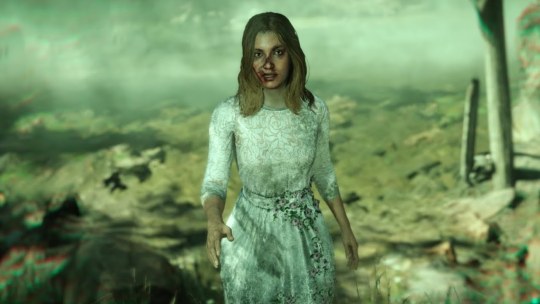
SUMMARY
Each of the Seeds act according to their own gospels, inflicted upon them by their own individual ‘Gods’. Joseph’s is the Voice. John’s are the Duncans. Jacob’s is his younger self.
And so who drives Faith?
She adores (and fears) Joseph. She learned from Jacob. But to assume that they are her Gods detracts from the severity of her actions and her evil. It removes her free will... and she is no Angel.
No, she must have set out to find a God of her own.
Tracey says of Faith: ‘This is what she does. Takes. Destroys.’ Faith knew misery in her life before the Project, and so is of the same mindset as the other Seeds- that happiness can only be found by enduring suffering and pain. And she may experience jealousy of others who have never had to suffer.
A quote I found on Nemesis read:
Nemesis believed that no one should ever have too much goodness in their lives, and she had always cursed those who were blessed with countless gifts.
In other words, Nemesis believed in punishing ‘undeserved good fortune’, not necessarily making people suffer completely, but suffer enough.
Just as she did.
Faith saw herself in this vengeful, loyal, beautiful goddess. She recognised her past and new mission within the holy figure’s doctrine. And with Joseph's open attitude as to how the Heralds chose to operate, she could easily merge her fantasies with his.
She became Nemesis, challenging the rightful goddess, and committing the very sin, the hubris, both of them sought to seek out and punish.
#far cry 5#far cry 5 meta#greek mythology#faith seed#joseph seed#john seed#jacob seed#marshall burke#virgil minkler#wikipedia is totally my friend hahahaha#i'm sorry if stuff is inaccurate#greek mythology is so complicated hahahaha#this started as just an analysis of nemesis#but the others fit so well#I just couldn't ignore them#I've been a coward about posting this for days now#I just get so nervous hahahahaha#hope you enjoy!
101 notes
·
View notes
Text
Lemongate: An F.A.Q.
What is Lemongate exactly?
Well, first of all, I'd like to thank you for not immediately dismissing the whole post as soon as you see the word 'lemon' separated from the word 'cakes'.
Oh. You don't have to thank me - how could I know whether I should dismiss it until I read the whole post? Speaking of which, can you get on with it? I still don't know what Lemongate is.
Lemongate is a fan term for the ongoing mystery of the House with the Red Door, Daenerys and Viserys' childhood home. Daenerys believes the Red Door is in Braavos, but the most prevalent aspect of her memory is the lemon tree outside her window - and we've been told multiple times, in multiple different ways, in multiple different books, that lemon trees don't grow in Braavos.
So what?
Well, on its own we might suspect author error. After all, the house with the red door memories were introduced in Daenerys I AGOT, and we didn't really get a thorough examination of how completely opposite Braavos is to the memories Dany has of her childhood until AFFC. Yet the lemon hints are present before that; in fact, lemons are the most prominent fruit in our story, having been focused on specifically from the beginning in Sansa and Arya's love of lemoncakes. And furthermore, nothing else about Dany's memories fit with the Braavos we know. She remembers sun, and grass, and hot, sweet smells - but the weather in Braavos is either rain, fog, or freezing rain.
You have the quotes to back all of this up, right? Because I get a sense of where you're going with this and I do not like it sir, not one bit.
Yes, I do, and you can find them elsewhere if you do some googling - but this is a quick FAQ about the lemon trees, not the resulting theories people have made concerning its meaning. To reiterate: this is not a thread debating parentage, or lineage, or major plot points likely to polarize a vast majority of the fan community. I simply want to clear up any misunderstanding regarding George's deliberate insertion of the lemon tree discrepancy.
But the tinfoilers believe that the lack of lemon trees in Braavos is proof Dany didn't grow up there, and thus isn't the son of Aerys and Rhaelle Targaryen - which is clearly true.
Is it? Because a frail woman who's physically abused and has had six miscarriages already seems unlikely to successfully bear a child in the middle of the "greatest storm in living memory." And there are a number of other odd things about a pregnant Rhaelle supposed flight to Dragonstone - for instance, Daenerys and Jaime's recollection of of Rhaelle's flight is wildly different - for instance, Dany believes that Viserys accompanied the pregnant Rhaelle, but we have no idea if this is true.
But as for Dany not being the child of Aerys and Rhaella, why is that such a tough pill to swallow? Our male lead has a secret heritage that will seemingly grant him access to powers and put him in positions to Save The World From The Others - why not our female lead?
Well I have nothing against that per se, but my understanding of the Lemongate theory is that it eventually results in the deeply unsatisfying B+A=J, R+L=D. Is this true?
I'm glad you asked! Absolutely not. This is not necessarily true. Sure, there is a case to be made for it with several convincing points of evidence - for instance, Dany seems to have Lyanna's natural ability to ride a horse, which is a big part of what helped her fit in with the Dothraki. But there are other ways to go with the idea that Dany's past is not all it seems and her parents may not be who she thinks than polluting our savior Jon Snow's Tower of Joy birth and Targaryen lineage. The point is, R=L=D can be reasonably called a "tinfoil" theory but Lemongate is fully confirmed fact.
Note the irony in the name - it's not just a reference to conspiracy theorists - it's a reference to Watergate, where Nixon managed to rule over the people using false and deceptive pretenses. If Dany is someone else and not actually the heir of House Targaryen, and the lemon trees point to her lack of true legitimacy, she would be an apt parallel to Nixon (and Jon and Euron, who also won "fair elections" through magical and political manipulation).
Wait, wait, back up. How is Dany not the true heir of House Targaryen? I thought you said Lemongate didn't necessarily mean R+L=D?
I did indeed. And while R+L=D would make Dany a bastard (even with a heart tree marriage, polygamy is not legitimate) and behind "Aegon" in the line of succession, we should remember why we always call him "Aegon" and not Aegon. Even a bastard inherits before a pretender.
But let's say R+L=D isn't true. Then we have to look around for a new set of parents. There's an ample supply of Dead Ladies for potential moms - with the leading candidates being Lyanna, Ashara, and Wylla (not dead but I can't imagine anyone getting to interview her anytime soon), and the Fisherman's daughter (Godric Borrel's story about Mama Snow has Ned impregnating a fisherman's daughter and leaving her with a sack of silver and a bastard - a story I believe to be a complete falsification designed to trick Davos and through him eventually trick Jon). There's also an equally ample supply of randy gentlemen with important bloodlines - though Brandon, Ned, Aerys, and Rhaegar seem like the clear front-runners as potential fathers for our two leads.
You're losing me fast, Holloway. Daenerys is clearly a Targaryen. She hatched fucking dragons.
You're right, she did. And hatching dragons is something the Targaryens haven't been able to do for hundreds of years. Incredible luck that Dany was the first one to pull it off. Incredible luck - or the "blood of the dragon" had gone dormant in House Targaryen, but could exist in another house. Because Daenerys is not definitely a Targaryen. She's definitely a Valyrian. We know this ipso facto from her silver hair and purple eyes. But do you know what other house has silver hair and purple eyes? House Dayne, a house so ancient and revered that the legend of Starfall goes back to the Dawn of Days. If there is "blood of the dragon", as the nobles of the Freehold believed, House Dayne is one of only four ancient Westerosi families besides the Targaryens with Valyrian features consistently present in their bloodline.
Wait, so you're saying Dany is the daughter of Ashara?
Well, it offers an explanation of why Ned tried to hard to protect Daenerys in AGOT and felt so guilty when he thought he had failed - he was in love with Ashara at one point, and if he knows Ashara is Daenerys' true mother, he may have felt an obligation to protect her - even at the risk of the realm. I'm sure we can all think of an ex we're not really over and would do stupid, irrational things for. And furthermore, Brandon and Ashara were together in King's Landing approximately nine months before Jon Snow and Dany enter the story, and Ashara is said to have "lost" a daughter in childbirth. And there is a straight up statement that she looks like Ashara’s daughter.
Even after all these years, Ser Barristan could still recall... those haunting purple eyes. Daenerys has the same eyes. Sometimes when the queen looked at him, he felt as if he were looking at Ashara’s daughter ...
..But again, this thread is not to push any particular parentage theory. It's simply to point out that without a doubt, Lemongate - the Braavosi weather issue - is real.
You keep saying "Lemongate is real, Lemongate is real." I think it's time we saw some quotes.
Fine. We first hear all about Dany's Lemon Tree in the first two books - it even appears on-page in her temptation in the House of the Undying. I'll spare you those quotes, but books 1 and 2 establish the template in Dany's memory, the reliability of which books 3, 4, 5, and 6 promptly and enthusiastically undermine. Basically, we're hammered over the head with two facts: Lemons DON'T grow in Braavos, but Dorne is FAMOUS for them.
For instance, Sharna the innkeep is requested to roast a duck with lemons, as a Dornish girl once did.
"Lemons. And where would we get lemons? Does this look like Dorne to you, you freckled fool? Why don't you hop out back to the lemon trees and pick us a bushel, and some nice olives and pomegranates too." She shook a finger at him.
And on the opposite side of the spectrum, we visit Braavos, we see the climate is completely unsuitable. And just in case we didn't (or chose not to) recognize it, GRRM has two guards have a half-page conversation about it in a TWOW sample chapter.
"Seven hells, this place is damp," she heard her guard complain. "I'm chilled to the bones. Where are the bloody orange trees? I always heard there were orange trees in the Free Cities. Lemons and limes. Pomegranates. Hot peppers, warm nights, girls with bare bellies. Where are the bare-bellied girls, I ask you?"
"Down in Lys, and Myr, and Old Volantis," the other guard replied. He was an older man, big-bellied and grizzled. "I went to Lys with Lord Tywin once, when he was Hand to Aerys. Braavos is north of King's Landing, fool. Can't you read a bloody map?"
And just to double down because he can, GRRM includes another reference in another TWOW chapter, where Arya's sister and dramatic counterpart makes the opposite observation.
For me, Alayne thought, as they wheeled it out. Sweetrobin loved lemon cakes too, but only after she told him that they were her favorites. The cake had required every lemon in the Vale, but Petyr had promised that he would send to Dorne for more.
I'm sorry, I didn't realize I was following /westerosmeteorology.tumblr.com
You're the one who asked for quotes. But yes, let's move on. I won't bombard you with all the other asynchronous Essentially what we have are two mysterious Valyrian mothers (Rhaelle and Ashara), two mysterious Valyrian fathers (Aerys and Rhaegar) and two mysterious "half-a-horse" Starks (Brandon and Ashara).
But wait! What about the courts and the gardens-
-of the mighty, yes yes. Here's the quote:
"There's no more wood." Dareon had paid the innkeep double for a room with a hearth, but none of them had realized that wood would be so costly here. Trees did not grow on Braavos, save in the courts and gardens of the mighty.
The contention of Lemongate deniers is that of course Dany could've been raised in Braavos - in one of those courts or gardens of the mighty. Hence, the lemon tree. There are two problems with this. First of all, let's address the Sealord's Palace and why it doesn't fit: Daenerys associates the House with the Red Door with a peaceful, isolated, happy life. In other words, the last Targaryens were trying to keep a very low profile. Being kept as a political capital by the Sealord in a magnificent palace with hundreds of rooms and a friggin' zoo is something Dany would remember. Second, just because the "mighty" can afford trees doesn't mean they can magically create a climate in which citrus trees can grow. After all, I think Dany would also remember if her treasured house of childhood innocence was encased in a giant Myrish greenhouse.
Okay, admittedly the difference in climates and the association of lemons with Dorne is pretty glaring. But I can't help but feel whatever this is leading to is inextricably linked to parentage, and I'm afraid the result might infringe on the one absolute certainty about the books to come: Rhaegar + Lyanna = Jon. After all, it has been literally confirmed by the show.
As GRRM would say, "the show is not the books." Yet I do feel that some discussion of the show is relevant here. Let's compare to another big book-only twist. In the books, Mance is swapped out for Rattleshirt, who burns in his place. The Rattleshirt we meet later is Mance in disguise. In the show, Mance is burned, plain and simple - but seemingly just to poke fun/clarify for book readers, the showrunners went to the effort of recasting and reintroducing Rattleshirt just so Tormund could beat him to death moments after running into him.
In other words, that's Dan and Dave saying "We're not doing this plot, guys."
Now compare to this scene in the show, where Arya, chased through Braavos by the Waif, literally slams into hundreds of citrus fruit being peddled by Braavosi merchants, scattering them all over the screen.
There's even a gratuitous closeup of an orange - a reference to the Godfather, a traditional symbol of impending death in cinema and literature, a way to add color - but maybe also a way of saying, "We're not doing this plot, guys."
Okay, okay, okay. Talk about weather and ambigious shots of lemons and random mentions of the lack of trees in Braavos all you want - it doesn't come close to confirming that Dany's red door memories are significant. Short of author confirmation, I'm sticking with Occam's Razor.
Once again - NOT arguing R+L does or does not equal J or D. I personally hate arguing about secret lineage. I am just pleading with the community to accept that George has included the lemon tree discrepancy on purpose and it is significant.
Fortunately, you don't have to take my word for that. I do actually have author confirmation. GRRM was asked this on Livejournal:
Dany remembers a lemon tree outside the house with the red door in Braavos, but citrus trees shouldn't really grow in Braavos's cold, foggy climate. Is this discrepancy significant? Does it point to future revelations about Dany's past? Thank you so much.
And in a very uncharacteristic fashion, he responded not with "keep reading," but with an outright confirmation of its importance. I hope you'll forgive me for putting this in big bold letters.
“Very perceptive of you.
Yes, it does point to . . . well, that would be telling.”
Source from Livejournal
Instead of acknowledging author error - which he does when applicable - or give his usual cryptic response, he straight up said "Yes, it is important" and implied that the questioner was perceptive for questioning Dany's past.
He really said that?
Yes. He did.
Wow... but why would Viserys agree to protect to Dany? Especially if her claim to the throne is better than his own?
The number one reason is he needed a relative to marry off for alliances - how else to secure any sort of decent army? But let's not forget that Aerys made Viserys his heir, disinheriting Rhaegar and all his kids. So whoever Dany was, Viserys was undeniably the true king. But yes, if Viserys has spent his life lying to Dany, it's possible Viserys had a lot of resentment over this, and that contributed to his eventual pattern of sadism toward Dany. He was a very complicated character with relatively little impact on the story. Then again, Viserys was six at the time they fled, and we don't know if he even accompanied Rhaelle to Dragonstone. If she had a stillbirth and Daenerys Doe was swapped in, perhaps Viserys never knew. Then again again, he's old enough to know they definitely didn't grow in Braavos.
I really don't like abandoning my preconceptions for the series, especially on such fundamental points as Jon Snow's parentage.
Again, I am not arguing for you to do that. Yes it is a coincidence that Dany seems to have been born in Dorne and born toward the end of the war, just like Jon. But there are many ways that R+L=J is compatible with Lemongate. I just wanted to get the facts of the Lemongate situation straight so we can jump into what it may really mean - because it is there for a reason.
Is this just you and some other crazy fans? Or is there anyone in the story who actually brings this up, and tells Dany that the House with the Red Door is anything more than a pleasant memory?
Yes. Quaithe. Quaithe all the time. Quaithe tries to get Dany to “remember who she is” and “go back” every chance she gets.
Well, if Lemongate not in there for some lame parentage reveal, then what?
Well, in my opinion Jon is Ned's son through his upbringing, through and through, and I don't know how not-lame any parentage reveal would be, R+L=J included. But beyond that, I don't know what Lemongate really means. Here's some thoughts:
Why did Oberyn try to raise Dorne for Viserys? Did he and Doran have Viserys in his possession - perhaps in Lemonwood?
Why has GRRM written the Sealord of Braavos as a man on his deathbed, so he will never be able to confirm the supposed marriage pact or any sheltering of Daenerys?
Why did Leyton Hightower freak out the same year Dany and Viserys were kicked out of the House with the Red Door? Was that the year he learned about Aegon, and suddenly realized he'd been sheltering the wrong Targaryen the entire time?
Anyway, these are obviously all frequently asked questions whenever this subject comes up, but the instant rejection it’s met with (even more than Tyrion Targaryen) usually prevents clarifications being made for people. I really, really would appreciate it if we could just accept the Lemongate/Braavosi climate contradiction, and extrapolate from there. All theories, and any other questions you may have, are welcome! I hope this post was at the very least informative, and hopefully minimally offensive. Thank you for reading!
TL;DR: Lemongate is the simple, irrefutable fact that Dany's House with the Red Door was not in Braavos. This does NOT mean R+L=D, and it does NOT disqualify R+L=J. However, it IS a clue of some importance, as confirmed by George himself. Let's start by accepting that, and work from there. What other twists could Dany's false childhood be leading up to?
#daenerys targaryen#daenerys stormborn#rhaella targaryen#aerys targaryen#dorne#braavos#lemon tree#lemons#red door#viserys targaryen#quaithe#george r.r. martin#lemongate#asoiaf#lyanna stark#brandon stark#ned stark#wylla#dragonstone#doran martell#oberyn martell#sealord#rhaegar targaryen#jon snow#illyrio mopatis#asoiafmeta
13 notes
·
View notes
Text
Kill The Buddha

I was in the metro (underground train) once in Milan, Italy. And I was in the first car, standing with my face towards the last car. As the metro was going through the streets towards downtown Milan, suddenly, for a second, all the cars lined up straight and I saw the people sitting and standing in the last car, which was probably the 7th or 8th car from me. I am sure it has happened to many people at many times, but it was the first and probably the last time for me. That's why it was so interesting. I said to myself, "Wow... tunnel vision".
At another level, I think that that is what happens to people branded as geniuses. Through hard work, perseverance and a bit of luck (in different proportions for different people), all the dots in their particular discipline suddenly line up for them and they see something maybe no one has seen before. They make sense of things which could have been non-sensical before.
I think Gautam Buddh, if he existed, was one such genius. He was able to connect the most critical dots about the human psychological and spiritual condition thousands of years before others did. He especially came to understand the effects of attachment like very very few others have before and after him. His words astonish and enlighten us to this day.
His basic saying on attachment is: "Attachment is the source of all suffering."
Another one is, "You only lose what you cling to."
There are many others.
Twenty five hundred years or so after his death, we still don't get it. We still continue to be attached to innumerable things, people, ideas, concepts, thoughts, desires, goals, images, etc.
Gautum inspired thousands of others to start exploring themselves. When Buddhism reached China, one of these inspired ones was Zen Master Linji, who gave one of the most shocking yet illuminating pieces of advice to the disciples, also about attachment, i.e., spiritual attachment in this case. It goes like this:
If you meet the Buddha on the road, kill him immediately.
What? Kill the Buddha? Isn't he like the originator of the Buddhist tradition? How can a seeker / a disciple kill the Buddha?
Lets break up the sentence and go deeper into it.
The sentences has two parts:
- "If you meet the Buddha on the road"
Lets remember that Linji is advising the disciple. Not all disciples are going to have the same path or the same experiences on the path. Hence he used the word, "if".
What is the experience Linji is talking about? "Meet the Buddha". It can have many meanings. One meaning is that when you are on the path, you have to leave all images behind. 'Buddha' is also an image. (And I am not talking about the statues of Buddha, which Gautum Buddh would be shocked and disappointed to find, since he was so much against statues and worship.) When we read about Buddhism or we listen to Buddhist sermons or we see Buddhist quotes or we see the statues, we develop an image in our minds as something good or bad or useless or something to be pursued or something to be converted to. We develop goals, i.e., to be a 'buddhist', to attain enlightenment, etc.
Another meaning could be that, when you are on the path you might come to a point when you start feeling that you are progressing towards enlightenment and that you are becoming a buddha yourself. Again, that is an image you hold in your mind. And Linji is warning that if you start thinking in terms of what you are 'achieving' or 'gaining' on the path, then you have actually left the path. You have lost your way. Thus, he says, if you see the buddha on the road, kill him immediately.
The moment we have developed goals and images and the moment we start thinking of ourselves as 'special' or as a 'buddhist' or as coming close to enlightenment, we are finished. We are no longer going in the right direction. Then the real teachings of Buddha will remain out of our reach and we will be stuck to those goals and images and thoughts.
The moment we we start getting attached to or holding on to a 'scripture' or a 'book of God' or when we start worshipping a prophet or 'son of God' or 'the mother of the son of God' or the Buddha or a 'guru' or 'tirthankara', the spirituality in us dies.
The difference between a living spirituality and a dead spirituality is the difference between a beautiful living flower on a stem and a dead flower someone has saved in a book. If you like to save dead flowers in books, of course there's nothing 'wrong' with it. Its just that it will not have the fragrance and the colors of a living flower. But if you don't want the fragrance or the colors, then it's not a big deal.
Buddha and Linji were talking to people who like living flowers on stem rather than dead flowers. They wanted us to stay alive, not become spiritually dead.
So, as we saw above, the words, "meet the Buddha" can have different meanings. It could mean having images or thoughts of the Buddha in your mind. Or, it could also mean having images about your own buddhahood. Yes, you are a buddha. Its just that you have forgotten that you're a buddha. And you have started thinking of yourself as a much smaller 'I', i.e., the ego
And what is a buddha? Someone who is unattached, silent, observant and unshakeably present in the herenow.
What is the road?
There is only one road, one path. On this path, one direction goes towards the inside, towards God. It is the direction of silence, stillness, quiet observation, simple and content living, a blissfulness without any goals. A world without time. Time is a utility which can be put aside and one can be timeless, without the attachment to the past or the future. Just being in the present. The forever flowing stillness of now. The pendulum stops. The polarities disappear. If someone throws a stone in the lake, it disappears in the lake without creating any ripples. No ripples at all. Someone hits me, I don't respond. Someone abuses me, I don't respond. Someone praises me or says they love me, I don't respond. Someone takes away all of my possessions, I don't respond. There is no response to the 'good' and no response to the 'bad'. There is just silence, stillness and observation. Images are flashing on the inner screen and passing away, then more images and more. And none of the images elicits a response.
The other direction is towards the outside, towards money, towards material possessions, images, goals, desires, discontentment, mental stress, anxiety and fear. 'Time is of the essence'. Goals need to be met. Net worth needs to keep growing. Images need to be maintained. The 'circle of control' needs to be expanded all the time and power needs to be exercised over as many people as possible. The past defines the present and the present must lead to a certain well thought out future. Everything must conform to our own plans. Otherwise, there is discontentment. Stillness is death. Silence is weakness. This direction also includes religious or spiritual goals, dreams and aspirations. Trying to be a good person to win the ticket to heaven, where there are all kinds of pleasures and comforts.
There is a beautiful Native Indian Cherokee story, in which a father teaches his son about good and evil through a parable involving two wolves. He tells his son that there is a terrible fight going on inside him between two wolves. One is good and the other is evil. The evil wolf has anger, envy, sorrow, regret, greed, arrogance, self-pity, greed, resentment, inferiority, lies, false pride, superiority and ego. The good wolf has joy, peace, love, hope, serenity, humility, kindness, benevolence, empathy, generosity, kindness and compassion. This fight, he told the young boy, is going on inside every one, including the little boy.
The boy is listening attentively. He asks, "Which wolf is going to win?"
The father says, "The one you are going to feed."
(see firstpeople.us/CherokeeLegends/TwoWolves)
It is is a beautiful parable. The two wolves are the two directions on the path we are talking about. You can choose which wolf to feed, which direction to start walking in.
Attachment, including attachment to spiritual or religious goals and aspirations, lies on the path of the ego.
Again, there is absolutely nothing 'wrong' with the path of attachment and ego. If that is what you need right now, then that is what you will get.
Whether you know it or not, consciously or sub-consciously, there is one thing you are seeking in life (see my other Post titled, 'The Big Fish'). That is the thing you will give anything to get. That is what you are after. It could be money or power or prestige or spiritual status or any other thing. That one thing, the 'Big Fish' in your life, determines which wolf you are going to feed, which side of the path you are going to choose.
Next, what does it mean to kill the Buddha?
It means, be silent, watchful and still. When the seeker is on the path, he / she has to stay silent,watchful and still.
Linji is warning that on the path, the seeker has to be absolutely naked. There must not be any attachments or images when you start the journey and also during the journey. There will, of course, be moments when the seeker is weak or discouraged or harbouring doubts and tries to get encouragement from the image of the Buddha or the goal of attaining nirvana. And there will be moments when, for example, the seeker has mastered the art of meditation or has attained an insight into some sutra or saying of the Buddha or has achieved something else which he considers as a substantial step on the journey and is ecstatic over it. Linji is saying that all these will pull the seeker back on the path.
If we see the teachings of the great wisdom teachers in parallel, we will find many consistencies / similarities. Why? Because their paths were identical and their destination was the same. Jesus, in one of his parables, has also warned that the seeker can be set back on the path if he is not watchful. This is the parable of the woman with the jar full of wheat grains (Thomas 97). It goes like this: There was a woman who was carrying a jar of wheat grains. As she was walking along, the handle of the jar broke and the grains started dropping out. The woman, not being very mindful and perhaps busy with her thoughts, did not realize what had happened. By the time she reached home and looked inside the jar, it was empty. All the grain was gone.
This is probably what Linji is warning about. We have to be watchful on the path. Otherwise, we will lose whatever understanding we have gained, whatever progress we have made. If there are any images arising in our minds, these need to be discarded. The mind has to be like a mirror. Any dust on the mirror has to be removed, otherwise we will not be able to see ourselves in the mirror. Whatever thoughts, ideas, images, experiences arise, we observe them and let them go. There is no holding on to anything, any thought, any image. If there is a reaction to these thoughts, ideas, images, we observe that reaction too. The more we observe, the more these thoughts, ideas and images will become like clouds passing by in the unchanging sky. There will emerge a silence and a stillness. That silence and that stillness is the path and it is also the destination. In that silence and stillness is the divine / the eternal / the universal, i.e., our true self.
So, "kill the Buddha" means letting go. Osho used to say it brilliantly: spirituality is not about finding God, its about letting go of yourself. The 'I' is the only thing separating God and us. If we let go of the 'I', there is no separation. All is one.
The 'I' / the ego is like a robe we are wearing and this robe is made of images. If we are not watchful, the Buddha or the idea of nirvana or moksha or enlightenment also becomes one of the images that the ego is made up of.
Linji is telling us to remain utterly naked. To maintain the oneness by not letting anything come between ourselves and God, not even the Buddha.
The events in Jesus' life, especially towards the end of his life, are also relevant here. Just before his arrest and trial for blasphemy and sedition, he is at a place called Gethsemane. Judas Iscariot (his disciple who turned traitor) has already told his enemies where Jesus is, so that they could come and arrest him. Jesus knows that he is about to be arrested. He is saying his final prayers, asking to be saved: "---Father, if it is possible, may this cup be taken from me. Yet, not as I will, but as You will"
Jesus knows that he will be tried and crucified. However, as the time is approaching, Jesus is feeling afraid of losing his life. He is fearful of death and is requesting God / Father to help him avoid death, if possible. At the same time, he is also submitting himself to God's will by saying, "not as I will, but as You will"
This is a moment of weakness which Jesus had just before the crucifixion. He has fallen prey to the fear of death. He is an enlightened being, he has felt oneness with God, he has transcended the boundaries ordinary individuals have and has experienced the eternal / universal self, he calls God his 'Father' and himself God's son, he has already become a great teacher, his vision is clear. And, yet, here he is, telling God that he does not want to die. He has lost his Buddha-nature. Or, to be more precise, he has lost his Christ-nature. Here he is just the man Jesus.
In the version given in the Book of Matthew, he says, "My God, my God, why have you forsaken me?"
He is complaining. It is as if he had some image of God and some expectation of what God was going to do if he (Jesus) was about to be hanged and that expectation is not being fulfilled.
But, Jesus is no ordinary being. He does fall, but he bounces back very quickly. When he is being crucified, he says from the cross, "Father, forgive them, for they do not know what they are doing."
For someone beaten mercilessly, hanging on the cross, with nails in his hands and feet, about to die, these are not the words of an ordinary man. No, he is back as the enlightened master and is setting yet another example of love by praying for people who are killing him.
This event from Jesus' life shows vividly what Master Linji was trying to teach. If you fall on the path, you've got to pick yourself up. You've got to kill the Buddha. Jesus killed his buddha, to speak metaphorically. He conquered his weaknesses and doubts. He regained his mindfulness. He let go of the final attachment, i.e., to his own life.
So, in a nutshell, meeting the Buddha on the road means falling down, falling prey to your own attachments... killing the Buddha means getting back up and letting go.
(Image by Charles Rondeau from Pixabay )
0 notes
Text
Chocolate-Dipped Brain Bites
This post was written as an assignment for Parsons Design & Technology Thesis 1 taught by Liza Stark and Ethan Silverman. It contains a self-bio, questions I generated over the summer, and prototypes I made before the beginning of the semester.
Being
Last night I reserved tickets for a queer games meeting happening in Brooklyn on Sunday, August 25. As I finished writing my name and information I was prompted with two boxes asking the following: “Are you interested in showing a game?”, “Are you interested in giving a talk?”
I spent two days with this page open, unsure how to answer before leaving them empty and hitting ‘submit’.
You may be wondering how this is relevant to my thesis assignment at all, but its this moment that defines a lot of where I am at right now. I came to DT to make games on top of the theory I studied in undergrad, but instead, I only dug further into thinking about games alongside making them. Except I am not making normal games anymore, that is what makes things so difficult.
Over the course of the last year, I explored games in a variety of fashions. I made games involving venting your feelings to your friends, games for me to explain my own trans trauma, games that questioned the act of play, and games that ask what a game really is. So, yeah I am at a pretty different place from when I came here hoping to make some cool video games. But the thing about the games I have been making lately is I am not sure where they fit in, and where the future of my work should fit in. I won’t figure that out in this blog post, but at the moment my games just feel a bit lost contextually.
Outside of my work, I like organizing community events. This comes into form in the DT community most of the time but I am trying to figure out how to expand that range as I won’t be in DT much longer. I also really enjoy thinking critically about the worlds objects, and watching the reality TV show Terrace House.
Part 1: Questions
How have the hegemonic ideals of game definitions limited affect, bodies, and expression?
The games encyclopedia has completely stagnated under the powers of capital and computers. Now we think that games must exist as an aesthetic of “fun” or “rewarding” within a magic circle separated from the world that results in no consequences. By continuing to think of games with these beliefs, the military-entertainment complex maintains some form of control over who gets the ability to feel and why.
Is conceptual art an avenue to continue experimenting in making games or should I depart from that area?
The past year I dove heavily into thinking about art, specifically conceptual and relational art. I saw a lot of parallels between the ways that games are constructed and those artifacts, and I wondered why games couldn’t be created in a similar manner. However, I’m starting to wonder if conceptual art isn’t the place where this conversation necessarily fits.
Is queerness a lens I want to continue thinking about in my work?
I came to DT hoping to explore queer design and games but I hit a lot of roadblocks over the course of the last year creating queer works. My games 54 More and Immanent Blocks, both taught me that creating identity-dependent work is an entirely different form of emotional labor added on top of communicating a project itself. My MS1 project Game Changers also taught me that creating work as a minority in a community that isn’t focused on said subject means that it's hard to find valuable criticism to move you forward, and administrative figures typically won’t understand. Finally, if I make queer work is it isolating a larger conversation I want to have about the systemic constrictions games cultures have maintained? Guess I will find out.
Part 2: Design Process & Prototypes
Prototype 1: Toilet Game (Huck Fuizinga)
For my first prototype, I decided I would try to create a game that does the opposite of everything Huizinga said in his book Homo Ludens. Why Huizinga? Because there are a lot of concepts I find in modern game forms that are constraining and prohibitive and I think that this book contains a lot of those ideas as it is a seminal text in the game studies field. That being said, Homo Ludens is a book about play. But, many of the things said about play in this book can be considered when thinking about games as well. So I pulled some quotes from the book and distilled them down to some values related to games then I created my design values from the opposite of these values. These are the values I came up with.

So, due to the limited amount of time I had for this prototype, it was impossible for me to create a game that satisfied every one of these design values. So I decided to use these design values as guides, instead of requirements. I ran into the problem of considering what an action truly “integral” to life could be, but instead of overthinking it I decided to go with an easy one. Pooping.
So I went to the bathroom for about an hour to two hours and sat on the toilet. During this time I thought about what could be an interesting experience to give players that fits within some of the other design guidelines. I wanted to make sure that the game was not something to be a tradition and something that may communicate moral values to the player. But how can you communicate morals through the act of doing your business? It is a very lonely act. I decided a way for the player to do this would be to leave an object behind for the next player to consider. I ended up with the following rule set. (You can find more of the document here https://1drv.ms/w/s!AiehfsctWGCih8MneP0PaMnK5PH4ew)

I decided the best place for this game to be played would be inside of a public restroom. So I got shipping labels and went out for a night on the town.
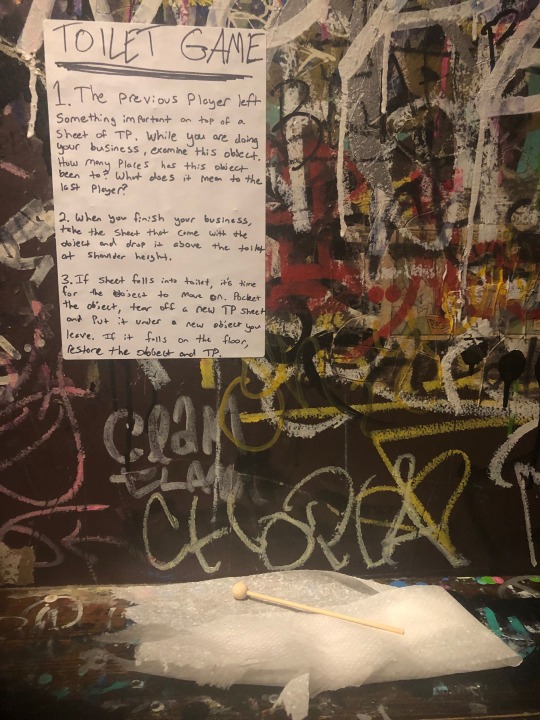

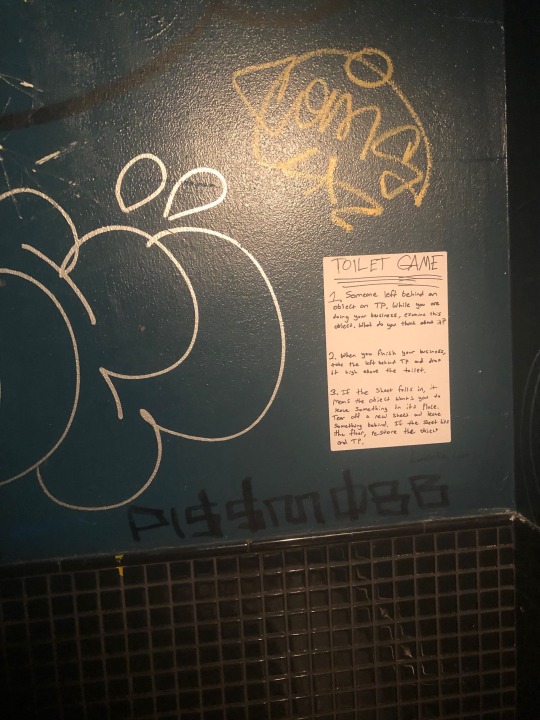

A downside to this being a bathroom based game is that it is a lot harder to gather feedback on how the users feel about the game. And honestly I didn’t from this one. It didn’t feel like it would be appropriate. But there are improvements I would make if I iterated on it such as the actions the players take, and the headspace the game asks them to be in.
Prototype 2: The Nonbeing
For my second prototype I didn’t want to read through a bunch of theory again so I decided to make something more emotional. I took inspration from Avery Alder’s Variations on Your Body and Yoko Ono’s Grapefruit to create a game about feeling disconnected from your body. Essentially being de-embodied. One may say that these two prototypes are vastly different from each other. One is in a public restroom, another is a more poetic experience. But that’s fine. It really all is to help answer my questions.
This game isn’t something that really works through pictures....because the game is just text. That is the thing about my games at the moment. They don’t necessarily need immediate forms because the forms are the people playing them. Yeah people could buy those toilet stickers or reprint them. There is definitely a form of this second prototype that could be fancied up and packaged. But the design is the embodiment of this specific headspace.
Also note this game isn’t finished, I spent 3 hours and decided I had already gone over the allotted time so I stopped myself. A finished version of this game would need a back half that finishes.
You can find the game “The Nonbeing” at this link. https://1drv.ms/w/s!AiehfsctWGCih8Mo-EPa51zOGxL4eQ
0 notes
Text
I just finished Impyrium by Henry H Neff and I’m gonna talk about it because I have a lot of feelings so spoiler warning
-I completely forgot the demon’s conditions for the Red Winter Treaty so I saw the Prusian Sea on the map and I was like “huh I wonder what the crafty bastard did to get an ocean named after him” and then I got to the line about underwater demon kingdoms and I was like THAT’S RIGHT THEY BANISHED HIM TO THE SEA and of course he still managed to go make himself a successful kingdom like ffs Prusias just enjoy retirement.
-Sigga Fenn is my new favorite character. What a bro. I mean yeah she played Hob like a panther stalking a rabbit and absolutely would have killed him in an instant and we don’t still know what her exact orders are but there are times when she does seem to be as sincere and friendly as she can professionally be and like honestly it’s nice to have such a chill agent. Disguising herself as the old lady was hilarious like that was so unnecessary Sigga you didn’t have to steal her dessert
-I love the dynamics between the triplets. Isabel is great.
-homunculus breeding is fascinating oh my god
-”Hazel saw that Harkün had also drawn a dagger with a wavy black blade” TFW you’re such a die-hard Cooper fan you can recognize his weapon 3000 years later
-speaking of the devil, I hope that Mystic with mismatched eyes was a descendant of who I think she was because please imagine Hazel Cooper’s reaction to finding her greatx3k granddaughter gambling with a domovoi
-Like. I know Prime is not going to turn out to be Cooper but there’s a tiny part of my sappy fangirl heart going, “if anyone were to volunteer themselves to be turned into a statue for all eternity to protect Rowan it would probably be him”
-Hob’s sass is beautiful can he give me lessons
-THERE WILL ALWAYS BE SHROPES COOKING AT ROWAN
-I love the quotes at the start of the chapters, not only did they bring more meaning to the chapters but they also provided some context and backstory, like how old David lived to be.
-Honestly Hazel’s mentality was so unapologetically realistic like she was so innocent and oblivious but then she started learning things and I love her revelations that she can take control of her own life. But like she was still allowed to be delicate and cry and sleep with a stuffed giraffe and it wasn’t depicted as weakness.
-I will be forever be impressed at the all the political webs Henry weaves
-Montague’s character development
-I wonder what Ember really did with Mina like did he really eat her or is she chillin in his mouth under the sea
-The two perspectives were so great and it was awesome because you can’t trust the Fellowship and you can’t trust the royals, you can only trust that the main characters themselves will see the faults of their respective sides and make the right decisions. I love how they opened each other’s eyes to new things.
-It’s so cool because The Tapestry was so heavily based in Irish mythology and now Impyrium is based in Tapestry mythology like the original series became the mythology of the new series, which means that our world is part of that mythology. I remember Henry saying something about how The Tapestry was partially a story about human perseverance and that really spoke to me in some parts of this book too. That ancient, scratched-up, barely-working Disney film was so unsettling but so wonderful. Burke’s line about “would you believe we lowly little humans once walked on the moon?” The part where the Fellowship is explaining about how humans once built flying ships and split matter to its smallest components without any magic, just with the sheer power of their minds. It’s inspiring. And it was interesting seeing that different perspective of the destruction of the Book of Thoth, like we were just starting to explore the heavens themselves and then that technology was taken away from us. But like it said, at least we’re still walking on the Earth. It’s surreal reading this and realizing that in this book we are the ancient civilizations. Much of our history is either not known at all or considered a nonsensical fairy tale. But Disney films and the Brothers Grimm tales still exist. Stories persevere, no matter how rare or expensive or illegal they may become. Getting even more meta, it’s just like the stories of the original series becoming the mythology of this one. Stories stick around, no matter how much they may change, and apparently the same applies to humanity.
-I would love to talk to someone who read Impyrium without reading The Tapestry first and find out what that realization was like, when it suddenly dawned on them that this had once been our world.
-It’s also really interesting and kind of funny seeing the empress and the princesses have the whole week-long pilgrimage and put themselves through such physical and mental duress to go worship this mysterious scary god-king from another world when those of us who have read The Tapestry know that this all-powerful warrior is the same guy who got repeatedly bossed around by a talking goose and once used magic to leap 20 feet in the air because he got startled by a robot centipede. The Hound of Rowan, everybody. One thing I always admired about Max’s character was that no matter how much he grew and changed the core of his personality, his kindness and his humor, stayed the same (and even when he went full supernova god in the Workshop he was still able to keep from destroying everybody because of the love he felt for his friends). And I’m glad that even just from that little glimpse we got of him we can see that he still holds that same personality, that he was so eager to help this teenage girl that he forgot about the FATAL WOUND that would literally kill him if he went through the gate like Max never change
-I was not expecting this story to give me so many Max feels like I thought I was over the end of The Red Winter but apparently not. I actually laughed when they brought out the lyrmrills as offerings because it was so beautifully nostalgic and sentimental but also like, what else would it be? The man loves his lymrills.
-Speaking of Max getting bossed around by Hannah I seem to remember her saying she was immortal at the end of The Red Winter so are she and her goslings still wandering around the Direwoods oh god
-Again it must be such a different experience reading this without the context of the first series because that whole Direwoods field trip was kind of a punch in the gut. I remember in The Hound of Rowan reading about the abandoned charges wandering the Sanctuary and forgetting that humans ever cared for them and I thought that was so sad and now the entire Sanctuary is like that. The Sanctuary was such a beacon of hope and peace and now it’s just a creepy haunted forest where little rich kids are afraid to get their feet dirty. Who knows how long selkies live, that could have been Frigga or Helga in the lagoon being so glad to have some humans to play with again. And the ruins of the Warming Lodge and the dvergar brother’s forge. Dude that one classroom had Nile Croakers and domovoi and stuff in cages and the selkies were described as “water beasts” like that was so sad it feels so wrong and it’s such a good representation of how the culture has changed
-Like honestly it’s just such a message about the nature of history. It reminds me of Church’s monologue from the end of season 13 of Red vs Blue, where he talked about the hero never getting to know if his sacrifice was worth it. Max didn’t know what became of his friends or the world he left behind presumably until David’s death (and don’t think I don’t have a fanfic idea about that), and then Max and David and everyone presumably don’t really know what became of their world 3000 years later, like they know the gate and the dragon exist and they know about the Faeregines coming on pilgrimage every few years, but I guess they probably don’t know much beyond that. They never get to see the long-lasting effects of their efforts, and they don’t get to know the perspectives with which people view them and the legends they’ve become. They didn’t want Rowan to become a place for snobby elites, and they didn’t want nonmagical people to be discriminated against, but they can’t do anything about it. Because we can act to change our history, but in the long run we never know how our stories will end up being told. But that doesn’t mean we shouldn’t take action to better our world for the present and the foreseeable future.
-I love all the subtle parallels, intentional or not, between this story and The Tapestry. Kids sneaking out at night for a sleepover on a ship, kids sneaking out for a duel. A man losing his face. Workshop specimens getting stolen. Being betrayed by a friend (honestly, I didn’t suspect Viktor at all until he suggested that they collect firewood and then my mind immediately went to Rolf and Connor for some reason even though there was no real connection). The illustration of Hob outside Hazel’s tent with the House Blade next to the fire reminded me so much of Cooper sneaking into Max’s tent with the poisoned Atropos blade, and it was Scathach the shadow who saved Max and Sigga the shadow who saved Hazel and Hob. History repeats itself. No matter how much some things change, some things still repeat.
-Olly was such a great character, like he had flaws but he acknowledged and apologized for them and he was so great. Sniff.
-Seriously Sigga is that teacher who’s like “I know you’re going though a lot so I’m going to conveniently forget to close the submission box until a while after the due date so I won’t know if you turned the homework in late but if I do catch you turning it in late I gotta fail you sorry”
-Also can we talk about the fact that Ember apparently fell in love with Astaroth’s hell dragon that he conjured from dead people like oh my god Ember plz you guys almost killed each other
-I feel like remember Henry saying something about us eventually getting to hear more about the grymholch from Prusias’s arena and the world it was from and I hope that happens
35 notes
·
View notes
Text
Guess who’s back in the world of BlazBlue!!!
So I just finished playing Central Fiction’s story mode and HOOOOOOOOOOOLY CRAP was that a ride. It was so good I was in tears at certain points. However it was not perfect. After playing it I just have to get out my thoughts about the game out. So here are my ramblings about everything in no particular order.
1. Obviously I miss the dub. While I did get used to the Japanese voices and they were certainly capable of handling all the drama well, the story will forever feel weaker than it could have been in dubbed form. I think the comedy suffered the most because unlike the previous games I never broke out into a full blown laughing fit, even for the Gag Reels.
2. I loved the sub-scenario system. BlazBlue has always struggled with how to present its story in a complete package. CT and CS had individual character stories followed by a True Ending which did give every character a lot of focus but at the cost of us having no single timeline of events, forcing us to try and piece together what is ultimately canon. CP ditched individual scenarios and instead had three routes to spread the focus around but this led to a lot of conflicting or repeated events that had the same problem as the previous games. CF’s system is the ultimate compromise. It has one single path that leaves no room for conflicting material but with diverging points that focus on the various subplots mostly separate from Ragna. If they ever make a new BlazBlue game I hope they keep this system.
3. The events equivalent to Act I of arcade mode went on a bit too long. Ultimately we don’t learn that much from it and all the characters have regressed in their development so we don’t gain anything from them. It was an interesting plot point but it wasn’t necessary.
4. Conversely, Acts II and III went by way too quickly, being pretty much just Ragna’s arcade runs. While later events do treat things as if all the arcade events of other characters happened offscreen (several characters mention meeting Izanami and know to search for Noel) it seems strange to have them all glossed over. Act III in particular suffers because the “Noel witch hunt” that drives it was basically a non-issue. Kagura and Kokonoe find and hide her immediately and she never has a breakdown from everyone trying to kill her. Seemingly important events like Amane reviving Takamagahara (which just gets a token mention during his final conversation with Ragna), Hibiki being willing to turn against Kagura for his desire and Tsubaki learning Hakumen is Jin are ignored. What we got after that was great but I don’t see why we couldn’t have had a few more sub-scenarios about that stuff.
5. I’m impressed with how well they managed to handle the defeats of so many villains (with the exception of Relius who just leaves without consequence and Nu who gets easily memory wiped). Nine, Arakune, Azrael, Izanami, Hazama and finally Terumi all have dramatic and satisfying defeats that don’t feel forced. Before release I was expecting Hazama to simply end up in the background and be held as reserve for a sequel villain once he separated from Terumi but what we got was so much better (granted he’s not dead since he’s almost certainly going to be in Bloodedge Experience sequels). In particular Terumi’s was really satisfying after everything that he’s done.
6. I’m really glad with how the Litchi/Arakune and Bullet/Tager subplots turned out. Despite the game’s focus on Ragna they were both given ample time to play out to their fullest. Litchi finally can move on from her self-destructive mission and Bang was the one to defeat Arakune (like I always envisioned it) to spare Litchi from such hardship (further proof why he is the best character). While Tager doesn’t regain his memories, Bullet can find closure and move on, proving she’s truly grown since she was a rookie. Both endings are bittersweet but they are done really well.
7. I’m not sure how to feel about how well Naoto’s inclusion was handled. On the one hand his role in the climax was perfect, having just one job that doesn’t overstep his importance. On the other hand, I’m disappointed with how little we actually learn about him. Apparently he has been hopping between parallel worlds multiple times to find Raquel but we don’t know how he ended up doing that. We also don’t get any answers to the major questions about him (why is he so similar to Ragna and why does he overwrite Ragna’s existence, what is the relationship between Rachel and Raquel, why does Naoto have that symbol on his chest etc.). I can only hope BE gets some kind of sequel because as is I am unsatisfied.
8. Es was utterly wasted in this game. She probably has less than 30 minutes of screen time in total and doesn’t actually accomplish anything with it. Before release I went on and on about how there are so many questions regarding how she can be here (namely she couldn’t have the Murakumo and the Azure Eyes at the same time and she can’t be outside the Phantom Field while she is the Embryo Storage) and the game answers none of them. Apparently this Es was “created by the Azure” but what does that mean? Is this a different Es that was made with the XBlaze one as a template and if so why was Es specifically chosen? Es mentions her loved ones several times (although she never specifies names outside of victory quotes) so clearly she has the XBlaze memories in some way but how does that work with her very different origin? Why does she perfectly remember her past in story mode but seems unaware of it in her victory quotes with her being confused about search terms in her memories? If it is an Es from post-XBlaze then what happened to the XBlaze world? Was it a “possibility” like the Bloodedge Experience world that disappeared? Was it from the same timeline as the Prime Field War? Should the fact that Es remains the Guardian of the Azure at the end be a good thing or is she being separated from Touya and the others for the sake of her duty. But the worst part of all is that not once in story or her arcade mode does she meet Nine and Celica. The majority of XBlaze: Lost Memories is about Watashi (Nine) and Imouto (Celica) become friends with Nobody (Es) and the ending clearly hints that they will meet again. At the very least there should have been a sub-scenario where Nine ends up in front of the Azure Gate for some reason (like Mu and Naoto did early on) and the two meet again but as enemies. It wouldn’t need to go anywhere, just have Nine doubt herself a little because she would have to fight against another one of her loved ones (which was the focus of her fight with Ragna and her death) or something like that. Heck even seeing Es’s silhouette when Nine mentions her loved ones would be something. It honestly seems like Mori had no idea what to do with Es so he just threw her in with no regard for continuity and it is easily the weakest part of the story.
9. Aside from the Es stuff I did enjoy that there were a lot of references to the side materials since I’m a lore nut. I love how Makoto reminds Es and Naoto of their respective Yuki’s. Hearing more details about Tomonori and seeing Kajun in the ending were great. I was absolutely ecstatic when Nine sees Celica as Imouto during her fight with Ragna, FINALLY being the 100% undeniable truth that the Mercury sisters are the characters in LM. That said, I could have done with just a few more, particularly on the XBlaze side. We should have gotten some reference to Nine using the Phantom Field or had her use the XBlaze in her left eye. Nine’s Overdrive being Burning Red highly suggested that we would see her using the Crimson Grimoire from Remix Heart, which last we saw was with Hazama. Ragna or Naoto should have triggered some memories of Touya in Es (at the very least he needed one namedrop) but most of this is just nitpicking.
10. ALL THE RAGNAXRACHEL SHIPPING!!! After CP had almost no new support since it focused so much on Ragna’s relationship with Celica, this game was the jackpot for the best ship in the series. With the disappearance of Celica and Noel fully accepting her position as Ragna’s sister, the path was clear for Rachel alone. We got great things like Rachel pushing herself to the point where she is close to disappearing just to help Ragna, Ragna being the maddest he has ever been after seeing Hazama torturing Rachel (as in so made he nearly became the Black Beast) and that FREAKING ANIMATED HUG, which was one of the most heart wrenching moments in the game. And of course there is the ending, with Rachel going off to find Ragna again no matter what hell she has to go through despite not even remembering who he is and even leaving her hair ribbons tied around his sword. Just DDDDAAAAWWWW!!!!
11. Speaking of the ending, even aside from the Rachel stuff it was pretty much perfect. It completed Ragna, Noel and especially Jin’s development masterfully and was just the right amount of bittersweet. Every characters epilogue was so fitting. Lambda living as a Sister with Noel is just too cute and I’m glad Naoto got the closure of finding Raquel. Pretty much everything that needed to be resolved was resolved.
12. The ending also had great cliffhangers that felt natural. Relius is still out there trying to complete Ignis, Hazama is unaccounted for (again probably will be the one we saw in the end of BE2), Carl hasn’t saved Ada yet but has taken a major step towards being a new villain as Relius Jr,, Azrael is still alive, merely sealed, Tsubaki has apparently become some kind of new Hakumen (although I doubt she has the Susano’o Unit since Hakumen and Trinity sealed it in the depths of the Boundary), the aforementioned Rachel journey and of course the post-credits scene with Ragna’s sword missing from the grave (implying he might still be alive) and the text hinting at Alpha-1.
And that’s pretty much it for my thoughts at the moment. Despite some complaints I am overall really happy with this game and glad I can finally get back into the discussion.
7 notes
·
View notes
Text
The Right Side of History: Backstage at the 91st Academy Awards
“This is my sixth glass,” quipped Spike Lee, drink in hand, upon entering the press room of the 91st Academy Awards. “And you know why.” The trailblazing director of such masterworks as “Do the Right Thing” and “When the Levees Broke” had just earned an Oscar for adapting Ron Stallworth’s memoir into the acclaimed Best Picture contender, “BlacKkKlansman,” along with fellow scribes Charlie Wachtel, David Rabinowitz and Kevin Wilmott. What should’ve been a joyous victory became bittersweet at best when Peter Farrelly’s intensely divisive “Green Book” took the night’s top prize, besting a slew of titles that favored diversity and representation over old-fashioned comfort food. Lee’s film is as unsettling and immediate as Farrelly’s is reassuring and eager to please. The focus of “Green Book” is an interracial friendship between an Italian-American bouncer and the African-American pianist he’s been hired to drive on a concert tour across various southern states during the volatile 1960s. 29 years ago, Lee received his first Oscar nomination for “Do the Right Thing” in the screenplay category—and lost—while “Driving Miss Daisy,” a strikingly similar feel-good picture about an elderly white woman’s friendship with her black chauffeur, was crowned as the year’s best film.
“Every time somebody is driving somebody, I lose,” Lee laughed while cavorting about the press stage, which he visited in the aftermath of the telecast. “But they changed the seating arrangement.” When pressed for his thoughts on the film to which he lost the Best Picture prize, the director said, “I thought I was courtside at the Garden. The ref made a bad call.” Lee’s prolonged sipping of his drink spoke more volumes about his frustration than any fiery elaboration. Yet he still credited April Reign’s #OscarsSoWhite campaign and the efforts of former Academy president Cheryl Boone Isaacs in creating the path that led him to win his first competitive Oscar, just three years after he was given an Honorary Award for career achievement. He also reflected on the alarming relevance of “Do the Right Thing,” where he tackled not only racial tensions and police brutality but gentrification and global warming. I instantly flashed back to the film’s 25th anniversary screening at Ebertfest, when an audience member suggested that the events portrayed onscreen had little relation to the present. It was mere months later that Ferguson occurred—a real-life mirror image of the famous climatic sequence in Lee’s 1989 film. By ending the story of “BlacKkKlansman,” chronicling a black police officer’s infiltration of the Ku Klux Klan, with a sudden cut to the white supremacist demonstrations in modern-day Charlottesville, Lee reaffirms that racist movements are not only still active but woven into the fabric of our culture.
“The coda of this film is where we saw homegrown red, white and blue terrorism,” said Lee. “The murder of Heather Heyer was an American terrorist act. When that car drove down that crowded street in Charlottesville, Virginia, the President of the United States did not refute, did not denounce the Klan, the alt-right, and neo-Nazis. Whether we won Best Picture or not, this film will stand the test of time being on the right side of history.” Lee told the press in attendance that he had prepared two acceptance speeches, one featuring a list of people to thank and the other, more artful draft, which he decided to go with instead. “I said to myself, ‘Self, your black ass may not be up here again, so let me go with the speech,’” the director recounted, and it’s a good thing he made that decision, since it resulted in one of most stunning monologues in recent Oscar history.
“The word today is irony,” said Lee after arriving onstage. “The date is the 24th. The month is February, which also happens to be the shortest month of the year, which also happens to be Black History Month. The year 2019, the year 1619. History, Herstory. 1619 to 2019, 400 years. 400 years our ancestors were stolen from Mother Africa and brought to Jamestown, Virginia, enslaved. Our ancestors worked the land from can’t see in the morning to can’t see at night. My grandmother, Zimmie Shelton Reatha, who lived to be 100 years young, was a Spelman College graduate even though her mother was a slave. My grandma saved fifty years of Social Security checks to put her first grandchild—she called me Spikie Poo—through Morehouse College and NYU Grad Film. N.Y.U.! Before the world tonight, I give praise for our ancestors who helped build this country into what it is today along with the genocide of its native people. If we all connect with our ancestors, we will have love, wisdom, and will regain our humanity. It will be a powerful moment. The 2020 presidential election is around the corner. Let’s all mobilize. Let’s all be on the right side of history. Make the moral choice between love versus hate. Let’s do the right thing! You know I had to get that in there!”
youtube
The applause from members of the press that greeted Farrelly and Nick Vallelonga, who shared Best Picture and Best Original Screenplay Oscars for “Green Book,” was conspicuously chilly when contrasted with the rapturous ovation that welcomed Lee moments later. Their film’s portrayal of the bond between Vallelonga’s father, Tony Lip (Viggo Mortensen), and the far more fascinating musician Dr. Don Shirley (Mahershala Ali), has been blasted as “a symphony of lies” by members of the late pianist’s family. Yet Vallelonga insisted that he told the story in the precise way that Shirley had instructed, arguing that this perspective on the subject is as valid as any.
“If you're discussing the Don Shirley family thing, that falls on me,” said Vallelonga. “Don Shirley himself told me not to speak to anyone. He told me the story that he wanted to tell. He protected his private life and all the other miraculous things about him. He's an amazing man. He told me, ‘If you're going to tell the story, you tell it from your father and me. No one else. Don't speak to anyone else. That's how you have to make it.’ He also told me not to make it until after he passed away. So I just kept my word to that man. I wish I could have reached out to Don Shirley's family. I didn't even know they really existed until after we were making the film, and we contacted his estate for music. Then the filmmakers invited them all to screenings and discussions. But I personally was not allowed to speak to his family, per Don Shirley's wishes. I'm an Italian from New York. They call that a stand-up guy. I kept my word to the man, and that's the reason for that. But Don Shirley and my father had an amazing story together. They went on the road and changed each other, and I think that comes out. That's why the film is what it is. It's because of the both of them.”
The pro-Trump tweet from 2015 that led Vallelonga to delete his Twitter once it was unearthed a month ago was echoed in a question directed to the filmmakers about whether Tony might’ve been a supporter of the current president.
“I never thought of him as a MAGA guy,” said Farrelly. “It's a different era, and whether he would have been one of those guys, I don't know. But he was a guy who was flawed in the beginning. For a couple of months, he was in a car with a man who was completely different from him, and they got to know each other, and they realized they had a lot more in common than they thought they did starting out on this journey. The message is, ‘Talk to each other, and you'll find out we all have a lot in common.’ It's a hopeful message, because sometimes it seems like there is no hope, but there is. All we have to do is talk, and we get closer together. I know that sounds corny and like, you know, Pollyanna-ish, but it's the truth. The only way to solve problems is to talk.”
Though Alfonso Cuarón’s widely perceived frontrunner, “Roma,” lost to “Green Book” in the Best Picture category, it did become the first Mexican nominee to win Best Foreign Film, and also picked up richly deserved honors for Best Director and Best Cinematography. Cuarón’s astonishing portrait of an indigenous maid in Mexico City who becomes a second mother to her client’s children was based on the actual woman who helped raise the filmmaker and his family during the turbulent early 70s. In his second acceptance speech of the night, Cuarón quoted French icon Claude Chabrol, who responded to a question about the New Wave by declaring, “There are no waves, there’s only ocean.” Cuarón then stressed that his fellow nominees, including Paweł Pawlikowski—who also directed an achingly personal, black and white stunner, “Cold War,” have proven that “we are all part of the same ocean.” The filmmaker also thanked the Academy for recognizing a film centering on “one of the 70 million domestic workers in the world without work rights, a character that has historically been relegated in the background in cinema. As artists our job is to look where others don’t. This responsibility becomes much more important in times when we are being encouraged to look away.”
In many ways, “Roma” serves as a spiritual companion piece to the director’s 2006 thriller, “Children of Men,” another immersive film tackling the challenge of bringing new life into a chaotic world. When I asked Cuarón about the parallels between these films, he replied, “I don't really see my films after I finish them. I prefer to see other people's movies. I don't really think so much about my films. I know that thematically and in terms of cinematic approach, they have a lot in common, but I would go farther back, probably to ‘Y Tu Mama Tambien,’ which is very connected to this film. But yeah, I will tell you something. The whole theme of birth—I was not even aware that I had been repeating that in my films until you journalists, people from the press and critics mentioned that. So yeah, I guess that there is a connection, but it's more up to you to find it.” Before he left the room, Cuarón expressed his gratitude to members of the press for being “amazingly respectful and supportive” to him during the long journey of awards season.
youtube
Another interviewee who made a point of thanking critics, surprisingly enough, was Best Actor winner Rami Malek, star of Bryan Singer’s poorly reviewed yet phenomenally profitable Freddie Mercury biopic, “Bohemian Rhapsody.” His sincerity and sweetness were so infectious that it left no doubt as to why Academy voters favored him on their ballots, in addition to the fact that his performance single-handedly carries much of the picture. “I don't think critically the decision on this film was unanimous,” said Malek, dryly making the understatement of the evening in his first words to the press, “but I do appreciate everything you guys had to write. As a kid, I read criticism of film, and I learned so much from it. So no matter what, I still do very much appreciate you.”
Malek got choked up when recalling the “tough battle” of making the film—most of it attributed to Singer, the fired director and alleged perpetrator of sexual assault who still was never mentioned either on or offstage—and how unlikely his Oscar win was in light of it. He also spoke about growing up as a first-generation American, the son of Egyptian immigrants, and how his status as an outsider made it all the easier for him to identify with the lead vocalist of Queen.
“I grew up in a world where I never thought I was going to play the lead on ‘Mr. Robot’ because I never saw anyone in a lead role that looked like me,” said Malek. “I never thought that I could possibly play Freddie Mercury until I realized his name was Farrokh Bulsara, and that is the most powerful message that was sent to me from the beginning. That was the motivation that allowed me to say, ‘Oh, I can do this. That man steps on stage and he moves people in a way that no one else does. He has the ability to look everyone in the eye and see them for who they are. And that's because he was struggling to identify himself. All of that passion and virtue and everything burning inside of him allowed him to look to everybody else and say, ‘Hey, I see you.’ Not right here in the front—I see you there in the back. I see all of you, I will play to all of you, and together we will transcend. Because it's not about being from one place or looking like one thing, one race. Any of that. We are all human beings. And forgive me for this, but collectively we are all the champions.”
Mahershala Ali’s unwavering class and genuinely humble demeanor also led him to emerge unscathed from the controversy endured by his film, as he received his second best Supporting Actor statuette only two years after his win for “Moonlight.” In the press room, he spoke warmly about his fellow nominees, all of whom had roles that fit the definition of “supporting player” much more than Don Shirley, who is practically a co-lead in “Green Book.”
“Any of those gentlemen could have been up here and would be, obviously, deserving of being up here,” said Ali. “They did wonderful work, beautiful work, work that inspired me. So to be the one that was chosen to get to hold this trophy again, it's not something that I take lightly. It's not something I take for granted. If anything, it makes me more aware of all the people that have really contributed to my life, from childhood to my team that works on my behalf and is always looking to take advantage of the best opportunities that are fit for me. And so I'm very grateful. The first one helped me get ‘Green Book.’ I don't think if I had won—I wasn't just getting offers like that, you know. Getting an Oscar for ‘Moonlight’ changes your profile. It gets you in other rooms, and it shines a light on your work. You could have been around for 15, 20 years and suddenly people notice you. I’m really grateful for that, because I've been wanting to work and expand and stretch. This was the first time I got to stretch my legs.”
Whereas Malek and Ali were largely favored to win their respective categories, hardly anyone expected Olivia Colman to claim Best Actress over seven-time nominee Glenn Close, who was considered to be unbeatable after her surprise win at the Golden Globes. No one appeared to be as shocked as Colman, the brilliant British star of Yorgos Lanthimos’ “The Favourite,” whose speech was so endearingly gobsmacked that it even got a laugh out of Close. By the time she arrived in the press room, Colman was almost entirely at a loss for words. I told her that I knew she was one of the great actors as soon as I saw her in Paddy Considine’s 2011 gem, “Tyrannosaur,” and asked how she went about finding the tragic in the absurd—and vice versa—as the neurotic queen in Lanthimos’ film. “Well, that is lovely of you,” Colman gushed. “That is a lovely thing for you to say. Thank you very much.” And then with a giggle, she answered, “I don’t know…sorry!” Later she admitted, “I could not tell you what I'm feeling. Next year, I might be able to put it into words, but I don't know what to do with myself at the moment.”
youtube
The pangs of disappointment undoubtedly experienced by Close were shared by your’s truly near the beginning of the telecast, when Jimi Chin and Elizabeth Chai Vasarhelyi’s visual powerhouse, “Free Solo,” won Best Documentary over Bing Liu’s Kartemquin production “Minding the Gap,” one of the very best films I’ve ever seen. So deeply was I invested in its victory that I wore a shirt baring its title under my tuxedo, if only to ensure that the film would have a presence in the press room regardless. Liu’s film is a testament to the cathartic power of cinema, enabling its subjects to see themselves reflected in each other’s story, as they open up about their experiences of domestic abuse and how it has shaped their young adulthood. I was reminded of the film when listening to the riveting words of Regina King, winner of Best Supporting Actress for “If Beale Street Could Talk,” directed by one of Liu’s most high-profile champions, Barry Jenkins. Recounting her most wrenching scene in the film, where her character, Sharon, encounters the woman who mistakenly believes she was raped by “Fonny” (the fiancé of Sharon’s daughter), King said she drew upon her own experiences as a woman.
“If we have not experienced a violation on that level firsthand, we have lifted a sister up through that,” King said. “Every woman that had something to do with this production [had] the understanding and the need to make sure that it was very clear in the story that we all knew that she was raped. It wasn't Fonny, but she was raped. And we hold each other up through a secret that shouldn't be a secret, so often. That's the beautiful thing about the #MeToo movement. It has gone beyond that with creating opportunities for women to find their voice—even beyond just being violated sexually, but being marginalized. When you have put in the work to be at the table and are denied a seat at the table, this movement has allowed us and has inspired us to say, ‘No, I am supposed to have a seat at that table.’ That energy was going on throughout the production of this film. Barry supported that and lifted it up as well. When you have men and women working together, pretty amazing things happen.”
There’s no question Lady Gaga would agree with King’s words, as she joined co-writers Mark Ronson, Anthony Rossomando and Andrew Wyatt in the press room following their Best Original Song win for their showstopper, “Shallow.” Gaga appeared with Bradley Cooper onstage for an uncommonly intimate performance on their signature tune, recapturing the chemistry that ignited their duets—both musical and otherwise—in the movie.
“There are many songs written for this film, but there was one song that was written with true, true friends of mine that I've known, and who know everything about me, the ups and the downs,” said Gaga. “And the truth is people see what they see on the outside. In some way, shape, or form, at times, we become architects. The truth is, I was so determined to live my dreams and yet there was so much in the way. There were so many things I did not anticipate that broke me, that tortured me, that traumatized me. And I think sometimes, what you are trying to clarify, is that people think that it comes easy to us because when we show up and we have our suits on, that it's all okay. But the truth is every single person on this stage has been through so much. We are friends. We have worked on ourselves in life. We have tried to heal through the torment of this industry and being artists. And the truth is that this is very, very hard work. It is not for the faint of heart. But I would never want to imply that anyone in the world is faint of heart. I wanted everyone tonight to feel like they could be each one of us on that stage.”
When she was handed her Oscar, Gaga said that she looked it in the eye and “saw a lot of pain. I saw all the things that I've been through. And I also felt the camaraderie and the truth of the pain that the men standing next to me have been through as well.”
“The song itself is a conversation, and it's between a man and a woman,” said Rossomando. “I think that maybe there's some timing involved where people's hearts are open to that conversation. Maybe that's why it's translated so widely. Someone sent me a couple videos this week of an entire church congregation singing the song. And it actually brought me to tears.”
“I really believe in my heart that the unfortunate truth is that our cell phones—as I watch you all typing—are becoming our reality,” said Gaga. “It's becoming reality for the world. And in this song, we provide not just a conversation, but also a very poignant statement. I wish to not be in the shallow, but I am. I wish to dive off the deep end, and watch me do it. I think this is something that speaks to many people. And during, I think, a very shallow time, it's a chance for us all to grab hands, dive off into the water together, and swim into the deepest depths of the ocean that we can.”
youtube
Though “BlacKkKlansman” was passed over for considerably lighter fare in the top category, an equally incendiary picture went on to be named Best Live Action Short Film. Israeli director Guy Nattiv’s “Skin” centers on a family of white supremacists and the senseless violence waged by its monstrous patriarch. When he severely beats a black man for having a harmless interaction with his son in a supermarket, the hateful sadist eventually finds himself having what can only be defined as an out-of-body experience. Asked whether the film was intended to be a response to the racism frequently voiced by President Trump and members of his administration, producer Jamie Ray Newman said that she and Nattiv weren’t necessarily trying to make a political statement.
“Guy is the grandchild of four Holocaust survivors,” said Newman. “He grew up with stories about the Holocaust. I'm Jewish as well, and I think that we just deeply want to explore. In the short, we explored how what you teach your children is going to perpetuate the next generation. We have a five-month-old, so we see she's a sponge. Everything we do, she inherits. The film starts out with a father shaving his boy's head because he's literally carving him in his own image. And the feature, which is next, is a true story about a very famous skinhead who was covered in neo-Nazi tattoos, and through the collaboration with a black activist, got all of them taken off. I think that the beauty of Guy as a filmmaker is he doesn't pound anything over your head. He's subtle. He doesn’t have answers, but he shows you the questions.”
While watching the film, I was struck by its excerpted inclusion of Mica Levi’s indelible score for Jonathan Glazer’s “Under the Skin.” It’s something only film musical aficionados would likely spot, and I couldn’t resist asking Nattiv about his soundtrack choice, considering Levi is one of the most exciting composers working today. “Mica Levi is probably the musician that influenced me more than any musician right now,” he told me. “I’m very influenced by her work, and I think that our musician was too. Inspiration is what I would call it. I hope to work with Mica one day on my next film.”
It’s only fitting that “Captain Marvel” stars Brie Larson and Samuel L. Jackson presented Spike Lee with his Academy Award, seeing as Marvel had a hugely successful evening, with Ryan Coogler’s “Black Panther” scooping up three accolades including the first Oscar for Lee’s longtime costume designer Ruth Carter. As the first-ever black recipient of the prize, she admitted to the press that she had been dreaming and praying for this night to arrive because of what it would mean for the young people coming behind her. Carter said that her innovative use of 3-D printing may have “tipped the iceberg” in her favor. It was UCLA professor Julia Koerner who developed the algorithm for the isicholo—the South African married woman's hat—in her computer and sent it to Belgium for 3-D printing.
“There were several iterations of the ‘Black Panther’ story through every comic book writer and illustrator, but it all started with Stan Lee and Jack Kirby, and their idea that the black community in the 60s needed a superhero,” noted Carter. “And guess what? The black community in 2018 needed a superhero as well. So with that, we created a new Wakanda because it's a forward nation. It's forward in technology. So we couldn't really use the old tech from the other comics. We had to create new tech. And with that, the door was open to us to be creative. […] I love the neck rings from the Ndebele tribe. I love the use of leather skins from the Himba women. I love the symbolism of the beadwork on the Dora Milaje. I love how their costume honors the female form. It shows that you can also be beautiful and be a warrior without being exploited.”
Another key member of the “Black Panther” team, Hannah Beachler, also made history as the first black production designer to be honored with an Oscar. Fighting back tears, she credited Coogler with enabling her to stand before the audience “with agency and self-worth,” and likened the massive undertaking of the project to “eating an elephant one spoonful at a time.”
“A lot of the inspiration came from where we located Wakanda on the continent, because if people were going to migrate, they were going to migrate around that area,” said Beachler. “So we took a very anthropological look at how the country was placed on the continent, and then from there, you've got your Omo Valley tribes that are in southeast Ethiopia. It's like they migrated down to Wakanda, and that became our river tribe. These were our inspirations. We wanted to be as real as we could.”
youtube
Few films I’ve seen in recent memory earned as euphoric a reaction as this year’s Oscar winner for Best Animated Feature, “Spider-Man: Into the Spider-Verse.” When the titular superhero’s co-creators Stan Lee and Steve Ditko, who both passed away last year, turned up at the end in a dedication card, the entire audience at my screening rose to its feet and cheered. After recounting this experience to the film’s trio of directors—Bob Persichetti, Peter Ramsey, Rodney Rothman—they told me that they had intended on mentioning the late comic mavericks in their acceptance speech, but were cut off by the music.
“We were going to thank Stan Lee and Steve Ditko for really inspiring this whole thing, and for being a force of believing that all of us—human beings—have the potential and the capacity to be heroes,” Persichetti told me. “Phil and Chris had put together a treatment for us to make a movie that challenged the audience to believe in themselves, believe in their neighbor and really be positive and make a difference in the world. And possibly be a mentor or be heroic. That was really it.”
Joining the trio onstage were the film’s co-writer/producer Phil Lord and producer Chris Miller, the extraordinarily inventive duo behind “The Lego Movie,” who are fully committed to expanding representation in cinema, as evidenced by the vibrantly diverse ensemble in “Spider-Verse.”
“When we hear that somebody’s kid was watching the movie and turned to them and said, ‘He looks like me,’ or, ‘They speak Spanish like us,’ we feel like we already won,” said Lord in his acceptance speech.
“To be a storyteller, it's really just about connecting with your audience, whether it's your little kid that you are putting to sleep or, apparently, millions of people who go see your movie,” reflected Persichetti in the press room. “So I think it's just validation of being a human and sharing the experience of being a human. It's kind of an amazing career.”
Added Miller, “To feel like you have affected someone else's life positively, one way or another, is a really magical thing that we don't take lightly.”
After the briskly paced three-hour-and-17-minute telecast came to a crisp close, I ran into Bing Liu, his mother and “Minding the Gap” producer Diane Quon outside the Dolby Theatre. I showed them the shirt I had been wearing under my tux all night, and they insisted on taking a picture of it. Liu may not have gone home with an Oscar in hand last night, but I have no doubt that when he encounters someone whose life has been deeply impacted by his work, he knows in his heart of hearts that he’s already won.
from All Content https://ift.tt/2XmY1J3
1 note
·
View note